

25,000+ students realised their study abroad dream with us. Take the first step today
Here’s your new year gift, one app for all your, study abroad needs, start your journey, track your progress, grow with the community and so much more.

Verification Code
An OTP has been sent to your registered mobile no. Please verify

Thanks for your comment !
Our team will review it before it's shown to our readers.

Speech Writing
- Updated on
- Jan 16, 2024

The power of good, inspiring, motivating, and thought-provoking speeches can never be overlooked. If we retrospect, a good speech has not only won people’s hearts but also has been a verbal tool to conquer nations. For centuries, many leaders have used this instrument to charm audiences with their powerful speeches. Apart from vocalizing your speech perfectly, the words you choose in a speech carry immense weight, and practising speech writing begins with our school life. Speech writing is an important part of the English syllabus for Class 12th, Class 11th, and Class 8th to 10th. This blog brings you the Speech Writing format, samples, examples, tips, and tricks!
What is Speech Writing?
Must Read: Story Writing Format for Class 9 & 10
Speech writing is the art of using proper grammar and expression to convey a thought or message to a reader. Speech writing isn’t all that distinct from other types of narrative writing. However, students should be aware of certain distinct punctuation and writing style techniques. While writing the ideal speech might be challenging, sticking to the appropriate speech writing structure will ensure that you never fall short.
“There are three things to aim at in public speaking: first, to get into your subject, then to get your subject into yourself, and lastly, to get your subject into the heart of your audience.”- Alexander Gregg
Speech in English Language Writing
The English language includes eight parts of speech i.e. nouns , pronouns , verbs , adjectives 410 , adverbs , prepositions, conjunctions, and interjections.
- Noun- A noun is a word that describes anything, such as an animal, a person, a place, or an emotion. Nouns are the building blocks for most sentences.
- Pronoun – Pronouns are words that can be used in place of nouns. They are used so that we don’t have to repeat words. This makes our writing and speaking much more natural.
- Verb – A verb is a term that implies activity or ‘doing.’ These are very vital for your children’s grammar studies, as a sentence cannot be complete without a verb.
- Adjective – An adjective is a term that describes something. An adjective is frequently used before a noun to add extra information or description.
- Prepositions- A preposition is a term that expresses the location or timing of something in relation to something else.
- Conjunction- Because every language has its own set of conjunctions, English conjunctions differ from those found in other languages. They’re typically used as a connecting word between two statements, concepts, or ideas.
- Interjections- Interjections are words that are used to describe a strong emotion or a sudden feeling.
Relevant Read: Speech on the Importance of English
How Do You Begin an English-Language Speech?
The way you start your English speech can set the tone for the remainder of it. This semester, there are a variety of options for you to begin presentations in your classes. For example, try some of these engaging speech in English language starters.
- Rhetorical questions : A rhetorical question is a figure of speech that uses a question to convey a point rather than asking for a response. The answer to a rhetorical question may be clear, yet the questioner asks it to emphasize the point. Rhetorical questions may be a good method for students to start their English speeches. This method of introducing your material might be appealing to the viewers and encourage them to consider how they personally relate to your issue.
- Statistics: When making an instructive or persuasive speech in an English class, statistics can help to strengthen the speaker’s authority and understanding of the subject. To get your point over quickly and create an emotional response, try using an unexpected statistic or fact that will resonate with the audience.
- Set up an imaginary scene: Create an imaginary situation in your audience’s thoughts if you want to persuade them to agree with you with your speech. This method of starting your speech assists each member of the audience in visualizing a fantastic scenario that you wish to see come true.
Relevant Read: Reported Speech Rules With Exercises
Format of Speech Writing
Here is the format of Speech Writing:
- Introduction : Greet the audience, tell them about yourself and further introduce the topic.
- Body : Present the topic in an elaborate way, explaining its key features, pros and cons, if any and the like.
- Conclusion : Summary of your speech, wrap up the topic and leave your audience with a compelling reminder to think about!
Let’s further understand each element of the format of Speech Writing in further detail:
Introduction
After the greetings, the Introduction has to be attention-getting. Quickly get people’s attention. The goal of a speech is to engage the audience and persuade them to think or act in your favour. The introduction must effectively include:
- A brief preview of your topic.
- Define the outlines of your speech. (For example, I’ll be talking about…First..Second…Third)
- Begin with a story, quote, fact, joke, or observation in the room. It shouldn’t be longer than 3-4 lines. (For Example: “Mahatma Gandhi said once…”, or “This topic reminds me of an incident/story…”)
This part is also important because that’s when your audience decides if the speech is worth their time. Keep your introduction factual, interesting, and convincing.
It is the most important part of any speech. You should provide a number of reasons and arguments to convince the audience to agree with you.
Handling objections is an important aspect of speech composition. There is no time for questions or concerns since a speech is a monologue. Any concerns that may occur during the speech will be addressed by a powerful speech. As a result, you’ll be able to respond to questions as they come in from the crowd. To make speech simpler you can prepare a flow chart of the details in a systematic way.
For example: If your speech is about waste management; distribute information and arrange it according to subparagraphs for your reference. It could include:
- What is Waste Management?
- Major techniques used to manage waste
- Advantages of Waste Management
- Importance of Waste Management
The conclusion should be something that the audience takes with them. It could be a reminder, a collective call to action, a summary of your speech, or a story. For example: “It is upon us to choose the fate of our home, the earth by choosing to begin waste management at our personal spaces.”
After concluding, add a few lines of gratitude to the audience for their time.
For example: “Thank you for being a wonderful audience and lending me your time. Hope this speech gave you something to take away.”

Practice Your Speech Writing with these English Speech topics for students !
How to Write a Speech?
A good speech is well-timed, informative, and thought-provoking. Here are the tips for writing a good school speech:
Speech Sandwich of Public Speaking
The introduction and conclusion must be crisp. People psychologically follow the primacy effect (tendency to remember the first part of the list/speech) and recency effect (tendency to recall the last part of the list/speech).
Use Concrete Facts
Make sure you thoroughly research your topic. Including facts appeals to the audience and makes your speech stronger. How much waste is managed? Give names of organisations and provide numerical data in one line.
Use Rhetorical Strategies and Humour
Include one or two open-ended or thought-provoking questions. For Example: “Would we want our future generation to face trouble due to global warming?” Also, make good use of humour and convenient jokes that engages your audience and keeps them listening.
Check Out: Message Writing
Know your Audience and Plan Accordingly
This is essential before writing your speech. To whom is it directed? The categorised audience on the basis of –
- Knowledge of the Topic (familiar or unfamiliar)
Use the information to formulate the speech accordingly, use information that they will understand, and a sentence that they can retain.
Timing Yourself is Important
An important aspect of your speech is to time yourself. Don’t write a speech that exceeds your word limit. Here’s how can decide the right timing for your speech writing:
- A one-minute speech roughly requires around 130-150 words
- A two-minute speech requires roughly around 250-300 words
Speech Writing Samples
Recommended Read: Letter Writing
Speech Writing Examples
Here are some examples to help you understand how to write a good speech. Read these to prepare for your next speech:
Write a speech to be delivered in the school assembly as Rahul/ Rubaina of Delhi Public School emphasises the importance of cleanliness, implying that the level of cleanliness represents the character of its residents. (150-200 words)
“Cleanliness is next to godliness,” said the great John Wesley. Hello, respected principal, instructors, and good friends. Today, I, Rahul/Rubaina, stand in front of you all to emphasise the significance of cleanliness.
Cleanliness is the condition or attribute of being or remaining clean. Everyone must learn about cleaning, hygiene, sanitation, and the different diseases that are produced by unsanitary circumstances. It is essential for physical well-being and the maintenance of a healthy atmosphere at home and at school. A filthy atmosphere invites a large number of mosquitos to grow and spread dangerous diseases. On the other side, poor personal cleanliness causes a variety of skin disorders as well as lowered immunity.
Habits formed at a young age become ingrained in one’s personality. Even if we teach our children to wash their hands before and after meals, brush their teeth and bathe on a regular basis, we are unconcerned about keeping public places clean. On October 2, 2014, the Indian Prime Minister began the “Swachh Bharat” programme to offer sanitation amenities to every family, including toilets, solid and liquid waste disposal systems, village cleanliness, and safe and appropriate drinking water supplies. Teachers and children in schools are actively participating in the ‘Clean India Campaign’ with zeal and excitement.
Good health ensures a healthy mind, which leads to better overall productivity, higher living standards, and economic development. It will improve India’s international standing. As a result, a clean environment is a green environment with fewer illnesses. Thus, cleanliness is defined as a symbol of mental purity.
Thank you very much.
Relevant Read: Speech on Corruption
You are Sahil/Sanya, the school’s Head Girl/Head Boy. You are greatly troubled by the increasing instances of aggressive behaviour among your students. You decide to speak about it during the morning assembly. Create a speech about “School Discipline.” (150 – 200 words)
INDISCIPLINE IN SCHOOLS,
It has been reported that the frequency of fights and incidences of bullying in our school has increased dramatically in the previous several months. Good morning to everyone present. Today, I, Sahil/Sanya, your head boy/girl, am here to shed light on the serious topic of “Increased Indiscipline in Schools.”
It has come to light that instructor disobedience, bullying, confrontations with students, truancy, and insults are becoming more widespread. Furthermore, there have been reports of parents noticing a shift in their children’s attitudes. As a result, many children are suffering emotionally, psychologically, and physically. The impact of this mindset on children at a young age is devastating and irreversible.
Not to mention the harm done to the school’s property. Theft of chalk, scribbling on desks, walls and lavatory doors, destruction of CCTV cameras and so forth. We are merely depriving ourselves of the comforts granted to us by doing so.
Following numerous meetings, it was determined that the main reasons for the problem were a lack of sufficient guidance, excessive use of social media, and peer pressure. The council is working to make things better. Everyone is required to take life skills classes. Counselling, motivating, and instilling friendly ideals will be part of the curriculum. Seminars for parents and students will be held on a regular basis.
A counsellor is being made available to help you all discuss your sentiments, grudges, and personal problems. We are doing everything we can and expect you to do the same.
So, let us work together to create an environment in which we encourage, motivate, assist, and be nice to one another because we are good and civilised humans capable of a great deal of love.
Relevant Read: How to Write a Speech on Discipline?
The current increase in incidences of violent student misbehaviour is cause for alarm for everyone. Students who learn how to manage their anger can help to alleviate the situation. Write a 150-200-word speech about the topic to be delivered at the school’s morning assembly. (10)
HOW TO CONTROL ANGER
Honourable Principal, Respected Teachers, and Dear Friends, I’d like to share a few “Ways to Manage Anger” with you today.
The growing intolerance among the younger generation, which is resulting in violence against teachers, is cause for severe concern. The guru-shishya parampara is losing its lustre. Aggressive behaviour in students can be provoked by a variety of factors, including self-defence, stressful circumstance, over-stimulation, or a lack of adult supervision.
It has become imperative to address the situation. Life skills workshops will be included in the curriculum. Teachers should be trained to deal with such stubborn and confrontational behaviours. Meditation and deep breathing are very beneficial and should be practised every morning. Students should be taught to count to ten before reacting angrily. Sessions on anger control and its importance must also be held.
Remember that Anger is one letter away from danger. It becomes much more crucial to be able to control one’s rage. It’s never too late to start, as a wise man once said.
“Every minute you stay angry, you lose sixty seconds of peace of mind.”
Relevant Read: English Speech Topics for Students
Example of a Great Speech
Martin Luther King Jr’s ‘I Have A Dream’ is one of his most famous speeches. Its impact has lasted through generations. The speech is written by utilising the techniques above. Here are some examples:
“still sadly crippled by the manacles of segregation and the chains of discrimination” – emotive Language
“In a sense, we’ve come to our nation’s capital to cash a check” – personalising the speech
“to stand up for freedom together” – a call to action.
Importantly, this is an example of how the listener comes first while drafting a speech. The language chosen appeals to a specific sort of audience and was widely utilised in 1963 when the speech was delivered.
English Speech Topics, Practice Time!
- The Best Day of My Life
- Social Media: Bane or Boon?
- Pros and Cons of Online Learning
- Benefits of Yoga
- If I had a Superpower
- I wish I were ______
- Environment Conservation
- Women Should Rule the World!
- The Best Lesson I Have Learned
- Paperbacks vs E-books
- How to Tackle a Bad Habit?
- My Favorite Pastime/Hobby
- Understanding Feminism
- Fear of Missing Out (FOMO): Is it real or not?
- Importance of Reading
- Importance of Books in Our Life
- My Favorite Fictional Character
- Introverts vs Extroverts
- Lessons to Learn from Sports
- Beauty is in the eye of the beholder
Also Read: How to Ace IELTS Writing Section?
Ans. Speech writing is the process of communicating a notion or message to a reader by employing proper punctuation and expression. Speech writing is similar to other types of narrative writing. However, students should be aware of some different punctuation and writing structure techniques.
Ans. Before beginning with the speech, choose an important topic. Create an outline; rehearse your speech, and adjust the outline based on comments from the rehearsal. This five-step strategy for speech planning serves as the foundation for both lessons and learning activities.
Ans. Writing down a speech is vital since it helps you better comprehend the issue, organises your thoughts, prevents errors in your speech, allows you to get more comfortable with it, and improves its overall quality.
Speech writing and public speaking are effective and influential. Hope this blog helped you know the various tips for writing the speech people would want to hear. If you need help in making the right career choices at any phase of your academic and professional journey, our Leverage Edu experts are here to guide you. Sign up for a free session now!
Team Leverage Edu
Leave a Reply Cancel reply
Save my name, email, and website in this browser for the next time I comment.
Contact no. *
14 comments
This site has been very helpful to me
Wow i have gained more knowledge
lt’s a nice One and l have loved it
Thank you for your feedback! Happy that you loved it.
Thank you for your feedback!
Very educating.
thanks for your valuable feedback
This is indeed very helpful
Thanks for your valuable feedback!
I have learned alot thank you
Hi, Thanks for your feedback!
Wow so reliable, thanks.

Leaving already?
8 Universities with higher ROI than IITs and IIMs
Grab this one-time opportunity to download this ebook
Connect With Us
25,000+ students realised their study abroad dream with us. take the first step today..

Resend OTP in

Need help with?
Study abroad.
UK, Canada, US & More
IELTS, GRE, GMAT & More
Scholarship, Loans & Forex
Country Preference
New Zealand
Which English test are you planning to take?
Which academic test are you planning to take.
Not Sure yet
When are you planning to take the exam?
Already booked my exam slot
Within 2 Months
Want to learn about the test
Which Degree do you wish to pursue?
When do you want to start studying abroad.
September 2024
January 2025
What is your budget to study abroad?

How would you describe this article ?
Please rate this article
We would like to hear more.
- Games, topic printables & more
- The 4 main speech types
- Example speeches
- Commemorative
- Declamation
- Demonstration
- Informative
- Introduction
- Student Council
- Speech topics
- Poems to read aloud
- How to write a speech
- Using props/visual aids
- Acute anxiety help
- Breathing exercises
- Letting go - free e-course
- Using self-hypnosis
- Delivery overview
- 4 modes of delivery
- How to make cue cards
- How to read a speech
- 9 vocal aspects
- Vocal variety
- Diction/articulation
- Pronunciation
- Speaking rate
- How to use pauses
- Eye contact
- Body language
- Voice image
- Voice health
- Public speaking activities and games
- About me/contact
How to write a good speech in 7 steps
By: Susan Dugdale
- an easily followed format for writing a great speech
Did you know writing a speech doesn't have be an anxious, nail biting experience?
Unsure? Don't be.
You may have lived with the idea you were never good with words for a long time. Or perhaps giving speeches at school brought you out in cold sweats.
However learning how to write a speech is relatively straight forward when you learn to write out loud.
And that's the journey I am offering to take you on: step by step.
To learn quickly, go slow
Take all the time you need. This speech format has 7 steps, each building on the next.
Walk, rather than run, your way through all of them. Don't be tempted to rush. Familiarize yourself with the ideas. Try them out.
I know there are well-advertised short cuts and promises of 'write a speech in 5 minutes'. However in reality they only truly work for somebody who already has the basic foundations of speech writing in place.
The foundation of good speech writing
These steps are the backbone of sound speech preparation. Learn and follow them well at the outset and yes, given more experience and practice you could probably flick something together quickly. Like any skill, the more it's used, the easier it gets.
In the meantime...
Step 1: Begin with a speech overview or outline
Are you in a hurry? Without time to read a whole page? Grab ... The Quick How to Write a Speech Checklist And come back to get the details later.
- WHO you are writing your speech for (your target audience)
- WHY you are preparing this speech. What's the main purpose of your speech? Is it to inform or tell your audience about something? To teach them a new skill or demonstrate something? To persuade or to entertain? (See 4 types of speeches: informative, demonstrative, persuasive and special occasion or entertaining for more.) What do you want them to think, feel or do as a result of listening the speech?
- WHAT your speech is going to be about (its topic) - You'll want to have thought through your main points and have ranked them in order of importance. And have sorted the supporting research you need to make those points effectively.
- HOW much time you have for your speech eg. 3 minutes, 5 minutes... The amount of time you've been allocated dictates how much content you need. If you're unsure check this page: how many words per minute in a speech: a quick reference guide . You'll find estimates of the number of words required for 1 - 10 minute speeches by slow, medium and fast talkers.
Use an outline
The best way to make sure you deliver a perfect speech is to start by carefully completing a speech outline covering the essentials: WHO, WHY, WHAT and HOW.
Beginning to write without thinking your speech through is a bit like heading off on a journey not knowing why you're traveling or where you're going to end up. You can find yourself lost in a deep, dark, murky muddle of ideas very quickly!
Pulling together a speech overview or outline is a much safer option. It's the map you'll follow to get where you want to go.
Get a blank speech outline template to complete
Click the link to find out a whole lot more about preparing a speech outline . ☺ You'll also find a free printable blank speech outline template. I recommend using it!
Understanding speech construction
Before you begin to write, using your completed outline as a guide, let's briefly look at what you're aiming to prepare.
- an opening or introduction
- the body where the bulk of the information is given
- and an ending (or summary).
Imagine your speech as a sandwich

If you think of a speech as a sandwich you'll get the idea.
The opening and ending are the slices of bread holding the filling (the major points or the body of your speech) together.
You can build yourself a simple sandwich with one filling (one big idea) or you could go gourmet and add up to three or, even five. The choice is yours.
But whatever you choose to serve, as a good cook, you need to consider who is going to eat it! And that's your audience.
So let's find out who they are before we do anything else.
Step 2: Know who you are talking to
Understanding your audience.
Did you know a good speech is never written from the speaker's point of view? ( If you need to know more about why check out this page on building rapport .)
Begin with the most important idea/point on your outline.
Consider HOW you can explain (show, tell) that to your audience in the most effective way for them to easily understand it.
Writing from the audience's point of view

To help you write from an audience point of view, it's a good idea to identify either a real person or the type of person who is most likely to be listening to you.
Make sure you select someone who represents the "majority" of the people who will be in your audience. That is they are neither struggling to comprehend you at the bottom of your scale or light-years ahead at the top.
Now imagine they are sitting next to you eagerly waiting to hear what you're going to say. Give them a name, for example, Joe, to help make them real.
Ask yourself
- How do I need to tailor my information to meet Joe's needs? For example, do you tell personal stories to illustrate your main points? Absolutely! Yes. This is a very powerful technique. (Click storytelling in speeches to find out more.)
- What type or level of language is right for Joe as well as my topic? For example if I use jargon (activity, industry or profession specific vocabulary) will it be understood?
Step 3: Writing as you speak
Writing oral language.
Write down what you want to say about your first main point as if you were talking directly to Joe.
If it helps, say it all out loud before you write it down and/or record it.
Use the information below as a guide
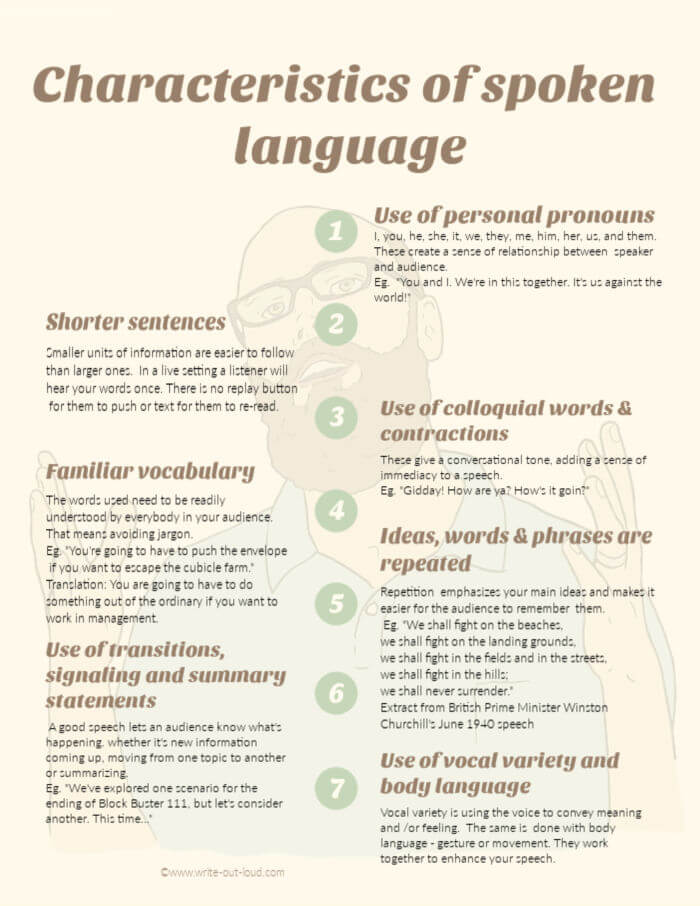
(Click to download The Characteristics of Spoken Language as a pdf.)
You do not have to write absolutely everything you're going to say down * but you do need to write down, or outline, the sequence of ideas to ensure they are logical and easily followed.
Remember too, to explain or illustrate your point with examples from your research.
( * Tip: If this is your first speech the safety net of having everything written down could be just what you need. It's easier to recover from a patch of jitters when you have a word by word manuscript than if you have either none, or a bare outline. Your call!)
Step 4: Checking tone and language
The focus of this step is re-working what you've done in Step 2 and 3.
You identified who you were talking to (Step 2) and in Step 3, wrote up your first main point. Is it right? Have you made yourself clear? Check it.
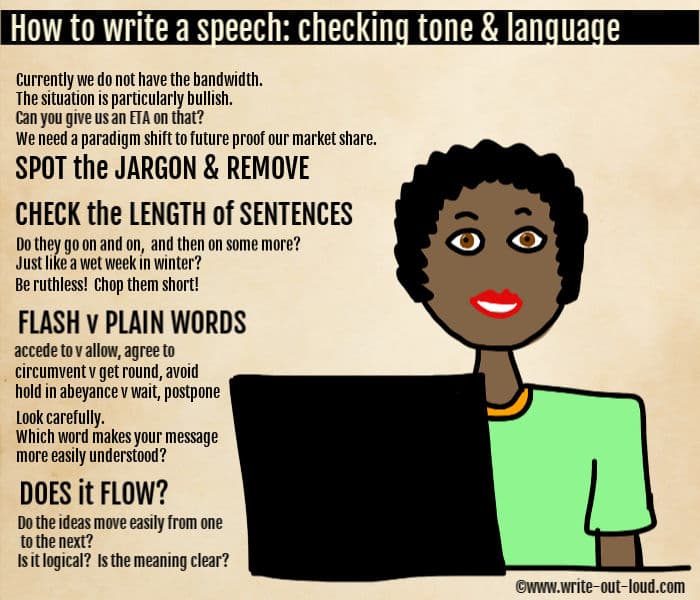
How well you complete this step depends on how well you understand the needs of the people who are going to listen to your speech.
Please do not assume because you know what you're talking about the person (Joe) you've chosen to represent your audience will too. Joe is not a mind-reader!
How to check what you've prepared
- Check the "tone" of your language . Is it right for the occasion, subject matter and your audience?
- Check the length of your sentences. You need short sentences. If they're too long or complicated you risk losing your listeners.
Check for jargon too. These are industry, activity or group exclusive words.
For instance take the phrase: authentic learning . This comes from teaching and refers to connecting lessons to the daily life of students. Authentic learning is learning that is relevant and meaningful for students. If you're not a teacher you may not understand the phrase.
The use of any vocabulary requiring insider knowledge needs to be thought through from the audience perspective. Jargon can close people out.
- Read what you've written out loud. If it flows naturally, in a logical manner, continue the process with your next main idea. If it doesn't, rework.
We use whole sentences and part ones, and we mix them up with asides or appeals e.g. "Did you get that? Of course you did. Right...Let's move it along. I was saying ..."
Click for more about the differences between spoken and written language .
And now repeat the process
Repeat this process for the remainder of your main ideas.
Because you've done the first one carefully, the rest should follow fairly easily.
Step 5: Use transitions
Providing links or transitions between main ideas.
Between each of your main ideas you need to provide a bridge or pathway for your audience. The clearer the pathway or bridge, the easier it is for them to make the transition from one idea to the next.

If your speech contains more than three main ideas and each is building on the last, then consider using a "catch-up" or summary as part of your transitions.
Is your speech being evaluated? Find out exactly what aspects you're being assessed on using this standard speech evaluation form
Link/transition examples
A link can be as simple as:
"We've explored one scenario for the ending of Block Buster 111, but let's consider another. This time..."
What follows this transition is the introduction of Main Idea Two.
Here's a summarizing link/transition example:
"We've ended Blockbuster 111 four ways so far. In the first, everybody died. In the second, everybody died BUT their ghosts remained to haunt the area. In the third, one villain died. His partner reformed and after a fight-out with the hero, they both strode off into the sunset, friends forever. In the fourth, the hero dies in a major battle but is reborn sometime in the future.
And now what about one more? What if nobody died? The fifth possibility..."
Go back through your main ideas checking the links. Remember Joe as you go. Try each transition or link out loud and really listen to yourself. Is it obvious? Easily followed?
Keep them if they are clear and concise.
For more about transitions (with examples) see Andrew Dlugan's excellent article, Speech Transitions: Magical words and Phrases .
Step 6: The end of your speech
The ideal ending is highly memorable . You want it to live on in the minds of your listeners long after your speech is finished. Often it combines a call to action with a summary of major points.

Example speech endings
Example 1: The desired outcome of a speech persuading people to vote for you in an upcoming election is that they get out there on voting day and do so. You can help that outcome along by calling them to register their support by signing a prepared pledge statement as they leave.
"We're agreed we want change. You can help us give it to you by signing this pledge statement as you leave. Be part of the change you want to see!
Example 2: The desired outcome is increased sales figures. The call to action is made urgent with the introduction of time specific incentives.
"You have three weeks from the time you leave this hall to make that dream family holiday in New Zealand yours. Can you do it? Will you do it? The kids will love it. Your wife will love it. Do it now!"
How to figure out the right call to action
A clue for working out what the most appropriate call to action might be, is to go back to your original purpose for giving the speech.
- Was it to motivate or inspire?
- Was it to persuade to a particular point of view?
- Was it to share specialist information?
- Was it to celebrate a person, a place, time or event?
Ask yourself what you want people to do as a result of having listened to your speech.
For more about ending speeches
Visit this page for more about how to end a speech effectively . You'll find two additional types of speech endings with examples.
Write and test
Write your ending and test it out loud. Try it out on a friend, or two. Is it good? Does it work?
Step 7: The introduction
Once you've got the filling (main ideas) the linking and the ending in place, it's time to focus on the introduction.
The introduction comes last as it's the most important part of your speech. This is the bit that either has people sitting up alert or slumped and waiting for you to end. It's the tone setter!
What makes a great speech opening?
Ideally you want an opening that makes listening to you the only thing the 'Joes' in the audience want to do.
You want them to forget they're hungry or that their chair is hard or that their bills need paying.
The way to do that is to capture their interest straight away. You do this with a "hook".
Hooks to catch your audience's attention
Hooks come in as many forms as there are speeches and audiences. Your task is work out what specific hook is needed to catch your audience.
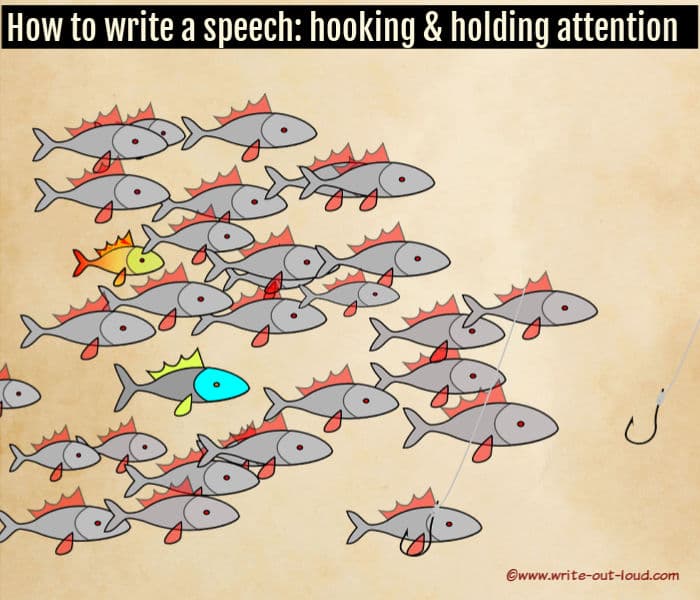
Go back to the purpose. Why are you giving this speech?
Once you have your answer, consider your call to action. What do you want the audience to do, and, or take away, as a result of listening to you?
Next think about the imaginary or real person you wrote for when you were focusing on your main ideas.
Choosing the best hook
- Is it humor?
- Would shock tactics work?
- Is it a rhetorical question?
- Is it formality or informality?
- Is it an outline or overview of what you're going to cover, including the call to action?
- Or is it a mix of all these elements?
A hook example
Here's an example from a fictional political speech. The speaker is lobbying for votes. His audience are predominately workers whose future's are not secure.
"How's your imagination this morning? Good? (Pause for response from audience) Great, I'm glad. Because we're going to put it to work starting right now.
I want you to see your future. What does it look like? Are you happy? Is everything as you want it to be? No? Let's change that. We could do it. And we could do it today.
At the end of this speech you're going to be given the opportunity to change your world, for a better one ...
No, I'm not a magician. Or a simpleton with big ideas and precious little commonsense. I'm an ordinary man, just like you. And I have a plan to share!"
And then our speaker is off into his main points supported by examples. The end, which he has already foreshadowed in his opening, is the call to vote for him.
Prepare several hooks
Experiment with several openings until you've found the one that serves your audience, your subject matter and your purpose best.
For many more examples of speech openings go to: how to write a speech introduction . You'll find 12 of the very best ways to start a speech.
That completes the initial seven steps towards writing your speech. If you've followed them all the way through, congratulations, you now have the text of your speech!
Although you might have the words, you're still a couple of steps away from being ready to deliver them. Both of them are essential if you want the very best outcome possible. They are below. Please take them.
Step 8: Checking content and timing
This step pulls everything together.
Check once, check twice, check three times & then once more!
Go through your speech really carefully.
On the first read through check you've got your main points in their correct order with supporting material, plus an effective introduction and ending.
On the second read through check the linking passages or transitions making sure they are clear and easily followed.
On the third reading check your sentence structure, language use and tone.
Double, triple check the timing
Now go though once more.
This time read it aloud slowly and time yourself.
If it's too long for the time allowance you've been given make the necessary cuts.
Start by looking at your examples rather than the main ideas themselves. If you've used several examples to illustrate one principal idea, cut the least important out.
Also look to see if you've repeated yourself unnecessarily or, gone off track. If it's not relevant, cut it.
Repeat the process, condensing until your speech fits the required length, preferably coming in just under your time limit.
You can also find out how approximately long it will take you to say the words you have by using this very handy words to minutes converter . It's an excellent tool, one I frequently use. While it can't give you a precise time, it does provide a reasonable estimate.
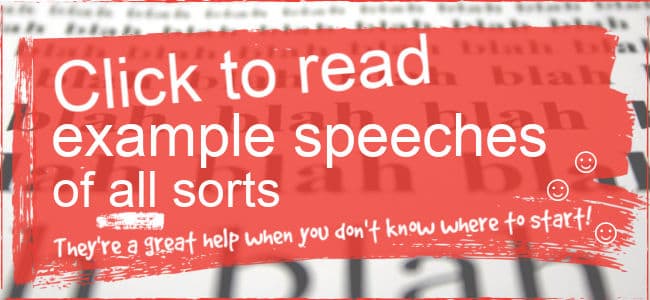
Step 9: Rehearsing your speech
And NOW you are finished with writing the speech, and are ready for REHEARSAL .
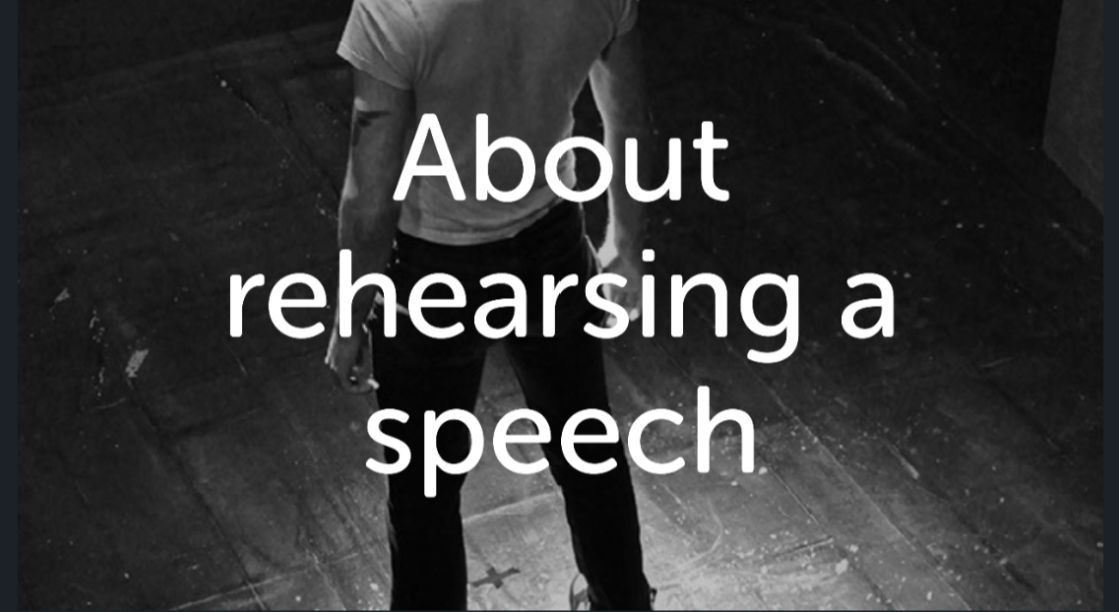
Please don't be tempted to skip this step. It is not an extra thrown in for good measure. It's essential.
The "not-so-secret" secret of successful speeches combines good writing with practice, practice and then, practicing some more.
Go to how to practice public speaking and you'll find rehearsal techniques and suggestions to boost your speech delivery from ordinary to extraordinary.
The Quick How to Write a Speech Checklist
Before you begin writing you need:.
- Your speech OUTLINE with your main ideas ranked in the order you're going to present them. (If you haven't done one complete this 4 step sample speech outline . It will make the writing process much easier.)
- Your RESEARCH
- You also need to know WHO you're speaking to, the PURPOSE of the speech and HOW long you're speaking for
The basic format
- the body where you present your main ideas
Split your time allowance so that you spend approximately 70% on the body and 15% each on the introduction and ending.
How to write the speech
- Write your main ideas out incorporating your examples and research
- Link them together making sure each flows in a smooth, logical progression
- Write your ending, summarizing your main ideas briefly and end with a call for action
- Write your introduction considering the 'hook' you're going to use to get your audience listening
- An often quoted saying to explain the process is: Tell them what you're going to tell them (Introduction) Tell them (Body of your speech - the main ideas plus examples) Tell them what you told them (The ending)
TEST before presenting. Read aloud several times to check the flow of material, the suitability of language and the timing.

- Return to top
speaking out loud
Subscribe for FREE weekly alerts about what's new For more see speaking out loud

Top 10 popular pages
- Welcome speech
- Demonstration speech topics
- Impromptu speech topic cards
- Thank you quotes
- Impromptu public speaking topics
- Farewell speeches
- Phrases for welcome speeches
- Student council speeches
- Free sample eulogies
From fear to fun in 28 ways
A complete one stop resource to scuttle fear in the best of all possible ways - with laughter.

Useful pages
- Search this site
- About me & Contact
- Blogging Aloud
- Free e-course
- Privacy policy
©Copyright 2006-24 www.write-out-loud.com
Designed and built by Clickstream Designs
How to start a speech for students (Ultimate opening lines)
Hrideep barot.
- Public Speaking , Speech Topics , Speech Writing

Schools and their love for speeches is an affair we are all quite aware of. Now if you are looking to move beyond the mundane way of delivering speeches in school and are in search of some amazing speech openings for students, you are at the right place!
Speeches are the most common form of public speaking that is encouraged in schools . Be it for a competition, assignment, presentation, or even as a punishment (oops), speeches are everywhere in a student’s life.
To get a quick idea on speech opening lines for students , don’t forget to check out our video on 3 speech opening lines for students!
But before we dive into understanding how to go about your speeches, it is important to first understand why educational institutes focus so much on speeches or public speaking in general that they begin introducing us to speeches as early as primary sections.
Why is speech encouraged in Primary school?
It is a common practice to give the students a little idea about giving speeches as early as primary school. Part of the reason is that these are the foundational years and form as a stepping stone for the students to get a little more used to public speaking as they move to higher classes .
A couple of ways students in primary schools may be asked to give speeches would be to introduce themselves or at competitions like fancy dress competitions.
What is the use of speech in high school?
In high school, as students gain more understanding about the world at large and develop their opinions, giving speeches is encouraged in school to help them navigate their thoughts to their peers. Further, speeches as a form of public speaking also help build the student’s soft skills .
A few ways giving speeches in high school can help in developing their soft skills are:
1. critical thinking.
Speeches aren’t about blurting out your ideas or opinions, rather it requires you to research and find evidence to back your point of view, or to think critically to deliver a speech that effectively reaches the other students.
2. Problem-solving
Speeches could be framed around a popular or controversial issue that the student wishes to provide their insight into. This would encourage them to come up with solutions. Apart from that, even coming up with a speech can be a task sometimes, and overcoming those challenges too can be counted in as a way of problem-solving
3. Time-management
With a huge number of students in high school, speeches are almost always time-bound. This also means that the students have to structure their speeches in a way that fits the time given, further inculcating time management skills in them.
4. Active listening
Speeches are not only about delivering or conveying your ideas or findings but also about listening carefully to what others have to say in terms of questions that may ask.
Why is speech required at college?
Speeches in college have an entirely different goal than the one that schools have.
In college, it isn’t always mandatory to give speeches or to participate in public speaking. However, a few reasons why giving speeches or public speaking is encouraged in colleges is because:
- It helps in developing communication and public speaking skills that can be very beneficial to their professional life later.
- Speeches may also be a way to meet new people and make new connections.
- It improves the student’s leadership skills. How? We have all heard how a good speaker carries with him or her the potential to influence and lead the crowd, and that is how practicing public speaking in college helps improve a student’s leadership skills.
When can students be asked to give a speech?
As we just discussed that the purpose of giving speeches changes as we progress in our school. However, there are a couple of situations where mostly all students are expected to present their speech. And they are:
Classroom/section speeches
Classroom or section speeches are the ones you give in front of your classmates or people from your age group. Generally, the presentation of assignments and competitions comes under this category.
Graduation Speech

Students may also be expected to present a graduation speech . However, the big difference here is that not everyone gets the opportunity to present a graduation speech or commencement address as it is known.
What type of speech is a graduation speech? Or what type of speech is a commencement speech?
Graduation speeches or commencement speeches are parting speeches wherein the focus is on reflecting on the good times in the institute and motivating others for their bright future ahead. Depending on the purpose as selected by the speaker, these speeches could be persuasive, informative, or entertaining in nature .
How to start a speech as a student
Giving speeches as a student, even if you have been doing it for the past few years can still end up being a little challenging. But rather than giving you tons of tips on things you can focus on while coming up with your speech or speech openings for students, we have got one ultimate tip . If you follow that, you should ideally be able to reach your audience more effectively.
Ultimate tip when writing speeches or speech openings for students
Write how you speak, not how you write.
When I came across this tip, I was surprised too. Because is indeed true that we write very differently when we have to show the speech to someone in written form but if asked honestly, do we speak in such a highly polished, extra professional vocabulary?
The idea is not to write the speech or speech opening riddled with slang but rather in a way that you’d feel comfortable listening to and understanding easily had you been the listener.
So in short, prepare the speech with the listener in mind, not the reader .
What is a good opening line for a speech?
Most opening lines for speech in school begin with a good morning. We usually follow it with greetings or addressing the audience and the guests.
Wondering how you greet everyone in a speech?
Here is a list of ways you can begin with a simple good morning:
- Good morning everyone presents here today. I’m delighted to present my views and understanding on a very delicate yet overlooked topic; Gender sensitization in the workplace.
- Good afternoon esteemed members of the jury, my friends and peers, and everyone present in the room today.
- Good morning to the faculty, the non-teaching staff, and the class of 2022!!
Now it is a good practice to begin your speech with your usual greetings. However, in this blog, we are trying to look beyond the usual.
It doesn’t mean that you will not be saying good morning or your basic greetings; the only difference is that you’ll not be opening your speech with it but addressing these basic formalities later in the speech.
How do you start a speech without saying good morning?
There are a couple of ways you can start a speech without saying good morning. Here are some of the ways we will take a look at in this blog:
- “Imagine” scenario
- “What if” scenario
- Rhetorical questions
- Statistics and figures
- Powerful statements
Quotes are phrases or things spoken by someone influential . Quotes as speech openings for students can not only help them go beyond the widely popular way of beginning any speech but will also help them establish credibility right in the very beginning!
Now if you have ever wondered,
How to start your speech with a quote?
Here are a couple of examples of using quotes as speech openings for students:
Lon Watters had said that “A school is a building with four walls, with tomorrow inside.” And it would be wrong if I said that I didn’t agree with every bit of what he said. As we come to an end of our journey with this school that has provided us with tons of opportunities to learn, grow, interact and make memories we sure will cherish forever…
“If you don’t have a plan for your life, somebody else does.” This is a quote given by Michael Hyatt and isn’t it something we have all been experiencing all these years of growing up as our parents or guardians make plans for us right from the way we dress to the school we go to and sometimes even the careers we choose. Good morning everyone, I am Myra, a student of XYZ school standing here to voice my opinion on “Factors that influence your career decisions.”
2. “Imagine” Scenario

This happens to be a personal favorite of mine when it comes to speech openings for students. A very simple yet beautiful way to engage your audience right at the beginning of your speech while at the same time allowing them to relate to what you’ll be saying next is what the image” scenarios are all about.
Before we begin, I’d like you to take a moment and imagine walking through a trail. You see the lush greens and pretty sky above you, the most dynamic clouds following everyone you go. Try sniffing the smell of wet soil and a hint of flowery fragrance as you walk towards the edge of the hill expecting to take a glimpse of the utter beauty that these hours of walking would lead you to, but you find something else. You see something that sends chills down your spine. There are some strange men performing rituals right in the very heart of these dense greens. You wonder what it is all about until it hits you; you have just uncovered a cult.
For the next example, I’d like you to take a look at the video below and check for yourself how wonderfully the speaker (although not a student) has made use of the “imagine” scenario to share his tragic experience with his audience.
Imagine a big explosion as you climb through 3,000 ft. Imagine a plane full of smoke. Imagine an engine going clack, clack, clack, clack, clack, clack, clack. It sounds scary. Well I had a unique seat that day. I was sitting in 1D.
3. “What If” Scenario
What if I told you that the best speech openings for students are actually the ones wherein they come up with an opening that best represents their style and comfort at delivering speeches, be it with a joke or a story?
Do you see what I did there?
That is an example of a “what if” scenario. It is similar to the imagination scenario we discussed above but the only difference here is that “what if” speech openings for students focus on providing an alternative idea to the audience while the imagined scenarios provide the audience an opportunity to relate to the speaker.
4. Rhetorical question
Rhetorical questions are questions the speaker includes in his/her/their speech that doesn’t necessarily require the audience to come up with an answer but are posed to get the audience thinking on the same.
Using rhetorical questions as speech openings for students can work wonders especially when you are looking for either a very quick speech opening or have very little time to deliver the speech.
An example of using rhetorical questions for speech opening is given below:
Talking about the new policy that makes it illegal to check the gender of the child before birth, do you think that it will curb the issue of female foeticide? Or will it simply take the activity underground?
The art of silence is phenomenal. Opening your speech in silence can help enhance your speech in two ways.
First, it will give the audience some time to settle in , post which you can expect to grab their dedicated attention. And secondly, silence would give you some time to understand the room and calm your pre-stage anxiousness .
6. Statistics and figures

Want to begin your speech on a hard-hitting and eye-opening note?
Show the numbers, the figures, and any statistics that serve your purpose for giving the speech.
It is very common to overlook the seriousness of any situation when you aren’t aware of the real extent of its seriousness. But when we have numbers in front of us, there is no more room for being in denial.
Examples of using Statistics or figures as speech openings for students
- According to the 2019 WWF report , on average, we consume about 1,769 microplastic particles every week. 1769 microplastic particles every single week, can you imagine that?
- 3.2 million teenagers between the age of 12-17 were depressed in the US as of 2017. Now you can only assume the number has increased over the past 5 years.
7. Powerful Statements
Powerful statements are statements that try to break any common ideologies held by the public. Another example of a powerful statement is stating a fact or idea that isn’t openly spoken .
The video below is one such example of how the speaker tries to break a perception generally held by the people.
How often have we been told to include stories in our speech?
Almost every time isn’t it? So here we are to bombard you yet again by saying that stories are extremely fun and engaging forms of speech openings for students.
You can either share your experience or someone else’s story.
You can also refer to a Recent Conversation by starting your speech with something like “Just the other day as I was walking out of my Philosophy lecture, I asked Mr.Dee about his philosophy on life, and what he said was so eye-opening that I could not wait to share with all of you.”
An adorable example of how to begin a speech with a story is given below to help you get a clearer idea.
Examples of speech openings for students
Speech opening lines for public speaking competitions.
When it comes to public speaking competitions like elocutions, speech competitions, or even presentations, it is almost always recommended to begin with self-introduction . The reason is quite simple; there is a high chance that your audience might not know you .
But if you don’t want to begin with a self-introduction, you can start by using any of the alternatives we discussed earlier. Click here to go back and take another peek at it.
Speech Opening Lines for Self-introductions
Speech openings for self-introductions need to be simple, to the point yet descriptive.
Wait a minute? Wasn’t I contradicting myself in that line?
Yes, but that is how opening lines for self-introductions would ideally work. As people expect you to talk about yourself in depth in the rest of your speech, your opening lines would just be a teaser about yourself.
2 most important things to add in your self-introduction opening lines for students
- What do you do?
Other things that you can talk about in these opening lines include:
- Where are you from?
- What is your goal?
- What does your organization do?
- A little bit about your family
Examples of opening lines for students
Good morning, I am Reini. I recently graduated from BMU college and have since been working as a Design intern at Desgynopedia.
Hello and good evening everyone. I am Nicole and this is my team, Alina, Tim, Harold, and Noman. We are in our senior year majoring in Organizational psychology. Today we would like to talk about the 5 main Psychological factors that impact any organization’s overall performance.
Hey, I am Nizan. I am a nerd for Political Science and Greek Philosophy and am currently majoring in the same. My love for the subjects is also the reason why I am here to present a topic I found very intriguing “The injustice behind socrates’ death.”
Funny speech opening lines for students
If you are giving a speech for a competition, one of the most fun ways of opening your speech could be to say “Good morning to the faculty, my friends, and (look at the opponents) others.”
Other funny opening line examples:
- I almost bunked school today until I realized that this speech carries marks and I sure don’t want to be in a class with our juniors. Just imagine! Who could do that?
- Hello and good morning to everyone, except the ones who are well prepared for their speeches today.
- Hello everyone, I’m excited to present my speech on XYZ’s topic today. I mean come on, what could be better than waking up at 7 am on a Monday morning to give a speech?
- Today I’ll be talking about XYZ because I was told to!
Best Speech Opening Lines by students
1. chase dahl.
In one of the funniest speech opening lines by students, Chase Dahl opens up by saying “You know I have never understood how imagining the audience naked was supposed to make you less nervous. Honestly, I’m just uncomfortable right now.”
2. Kyle Martin (The King’s Academy)
Yet another Valedictorian speech that has caught our eye is the one given by Kyle Martin. The reason we would suggest you take a look into the opening lines of his speech is so that you can take notes on how beautifully he has described the efforts taken by every department of the institute as he tries to thank them for their efforts.
Presentation Opening Lines
Presentation speeches are a little different compared to your usual speeches and the major reason for that is because now you have access to visuals or your PPT.
Besides some of the ways already discussed above, you can begin the presentation by pointing out a particular slide. You can show your audience a graph, table, pictures, or any other creative and eye-catching ideas that can also turn out to be an amazing presentation opening.
How to start a presentation speech example for students
A few common ways you can open your speech are:
- Hello everyone, I am Miya. I would first like to thank you all for your time.
- For those who don’t know me, my name is Nazia, and if you do know me, hello again!
- Good afternoon to all you wonderful people present here. I am Ryan and as you can see on screen, today I’ll be speaking on “The hazards of drinking from plastic bottles.”
For more examples of opening lines check out 50 Speech Opening Lines .
You might also like to know:
How to start a speech for the student council.
Speeches for student council are usually persuasive. They are your pitch to convince your fellow students to vote for you and help you get the position you are looking for.
So ideally, you should start by addressing everyone in the room . Then make a point to introduce yourself. Once you have introduced yourself, remind the audience why you are speaking which means let them know the position you are campaigning for. Bring up at least 1-2 issues that the students are most concerned about and tell them how if elected you’ll provide solutions to their issues.
Try to end it on a high note and don’t forget to add your campaign slogan .
You can also begin by stating your campaign slogan .
Yet another way to begin your speech for the student council is by challenging your opponent’s point of view or campaign . However, this would work only f you have a better strategy or solutions to the issues raised by your opponents.
Lastly, do something that no one expects from you . Let me share a story here to help you understand this point better. During one of the student council speeches, one candidate asked the audience to stand up, move a step in the front then go back to their seats and settle down. Following this, she said, “My parents told me if I could move the audience, I’d win.” And so she did win!
What is a speech class?
A speech class in high school or college is usually a short course or 1-semester course wherein the student is expected to improve on their public speaking skills along with critical thinking and active listening skills.
It essentially enhances their oral communication skills.
This also reminds me to introduce you to our courses that help enhance your public speaking and communication skills. If you are interested, head to Frantically Speaking .
But if your appetite for learning more about opening speeches isn’t satiated yet, we suggest you go check out our Video on the Powerful speech opening lines.
To Conclude
There are tons of ways to get creative with speech openings for students. From saying a simple good morning to adding stories, quotes, statistics, rhetorical questions, and even silence!
Get creative with your speech openings. As we always say, there are no right or wrong ways of public speaking as such, only a way that suits perfectly for you is the one that is right for you.
Enroll in our transformative 1:1 Coaching Program
Schedule a call with our expert communication coach to know if this program would be the right fit for you

8 Ways to Rise Above the Noise to Communicate Better

How to Negotiate: The Art of Getting What You Want

10 Hand Gestures That Will Make You More Confident and Efficient

- [email protected]
- +91 98203 57888
Get our latest tips and tricks in your inbox always
Copyright © 2023 Frantically Speaking All rights reserved
Kindly drop your contact details so that we can arrange call back
Select Country Afghanistan Albania Algeria AmericanSamoa Andorra Angola Anguilla Antigua and Barbuda Argentina Armenia Aruba Australia Austria Azerbaijan Bahamas Bahrain Bangladesh Barbados Belarus Belgium Belize Benin Bermuda Bhutan Bosnia and Herzegovina Botswana Brazil British Indian Ocean Territory Bulgaria Burkina Faso Burundi Cambodia Cameroon Canada Cape Verde Cayman Islands Central African Republic Chad Chile China Christmas Island Colombia Comoros Congo Cook Islands Costa Rica Croatia Cuba Cyprus Czech Republic Denmark Djibouti Dominica Dominican Republic Ecuador Egypt El Salvador Equatorial Guinea Eritrea Estonia Ethiopia Faroe Islands Fiji Finland France French Guiana French Polynesia Gabon Gambia Georgia Germany Ghana Gibraltar Greece Greenland Grenada Guadeloupe Guam Guatemala Guinea Guinea-Bissau Guyana Haiti Honduras Hungary Iceland India Indonesia Iraq Ireland Israel Italy Jamaica Japan Jordan Kazakhstan Kenya Kiribati Kuwait Kyrgyzstan Latvia Lebanon Lesotho Liberia Liechtenstein Lithuania Luxembourg Madagascar Malawi Malaysia Maldives Mali Malta Marshall Islands Martinique Mauritania Mauritius Mayotte Mexico Monaco Mongolia Montenegro Montserrat Morocco Myanmar Namibia Nauru Nepal Netherlands Netherlands Antilles New Caledonia New Zealand Nicaragua Niger Nigeria Niue Norfolk Island Northern Mariana Islands Norway Oman Pakistan Palau Panama Papua New Guinea Paraguay Peru Philippines Poland Portugal Puerto Rico Qatar Romania Rwanda Samoa San Marino Saudi Arabia Senegal Serbia Seychelles Sierra Leone Singapore Slovakia Slovenia Solomon Islands South Africa South Georgia and the South Sandwich Islands Spain Sri Lanka Sudan Suriname Swaziland Sweden Switzerland Tajikistan Thailand Togo Tokelau Tonga Trinidad and Tobago Tunisia Turkey Turkmenistan Turks and Caicos Islands Tuvalu Uganda Ukraine United Arab Emirates United Kingdom United States Uruguay Uzbekistan Vanuatu Wallis and Futuna Yemen Zambia Zimbabwe land Islands Antarctica Bolivia, Plurinational State of Brunei Darussalam Cocos (Keeling) Islands Congo, The Democratic Republic of the Cote d'Ivoire Falkland Islands (Malvinas) Guernsey Holy See (Vatican City State) Hong Kong Iran, Islamic Republic of Isle of Man Jersey Korea, Democratic People's Republic of Korea, Republic of Lao People's Democratic Republic Libyan Arab Jamahiriya Macao Macedonia, The Former Yugoslav Republic of Micronesia, Federated States of Moldova, Republic of Mozambique Palestinian Territory, Occupied Pitcairn Réunion Russia Saint Barthélemy Saint Helena, Ascension and Tristan Da Cunha Saint Kitts and Nevis Saint Lucia Saint Martin Saint Pierre and Miquelon Saint Vincent and the Grenadines Sao Tome and Principe Somalia Svalbard and Jan Mayen Syrian Arab Republic Taiwan, Province of China Tanzania, United Republic of Timor-Leste Venezuela, Bolivarian Republic of Viet Nam Virgin Islands, British Virgin Islands, U.S.


Speech Writing Format, Tips and Examples

Table of Contents
Speech Writing : Speech writing is a skill that can empower you to convey your thoughts, inspire others, and leave a lasting impact. Whether you’re preparing a speech for a school , a business meeting, or a special occasion, knowing how to craft an effective speech is invaluable. In this blog, we’ll explore what makes good speech writing, the structure of a speech, and the eight essential steps to ensure your speech resonates with your audience. Let’s dive into the world of successful speech writing Class 11 !
Fill Out the Form for Expert Academic Guidance!
Please indicate your interest Live Classes Books Test Series Self Learning
Verify OTP Code (required)
I agree to the terms and conditions and privacy policy .
Fill complete details
Target Exam ---

What is Good Speech Writing?
Good speech writing refers to the skillful art of starting a speech that effectively communicates a message, engages the audience, and leaves a lasting impact. Deliver an impactful and inspiring speech on success , unveiling the keys to achievement and empowerment that captivate your audience.” A well-written speech is characterized by several key elements:
Clarity: A good speech is clear and easy to understand. It conveys the message in a straightforward manner, avoiding unnecessary jargon or complexity.
Relevance: It is tailored to the audience’s needs and interests. A good speech addresses the concerns and expectations of the audience, making it relatable and engaging.
Structure: A well-structured speech has a clear beginning, middle, and end. It follows a logical flow, with each section building upon the previous one.
Engagement: Good speech writing captures the audience’s attention from the start and maintains it throughout the speech. It uses effective hooks, anecdotes, and rhetorical devices to engage the audience emotionally and intellectually.
Content: The content of a good speech is well-researched and supported by credible evidence, facts, examples, and anecdotes. It provides valuable information or conveys a persuasive argument.
Delivery: While speech writing focuses on the text, good delivery speech is essential for effective communication. A well-written speech is delivered with confidence, appropriate tone, and proper pacing.
Memorability: A good speech leaves a lasting impression on the audience. It may include memorable quotes, stories, or calls to action that resonate with listeners.
Purpose: The purpose of the speech is clearly defined, whether it’s to inform, persuade, inspire, entertain, or a combination of these objectives. The speech aligns with its intended purpose.
Connection: It establishes a connection with the audience by addressing their concerns, values, and emotions. A good speech can make the audience feel heard and understood.
Impact: Ultimately, good speech writing aims to have an impact. It may lead to changed perspectives, inspired actions, or a deeper understanding of the topic.
How to Start a Speech in English
The opening of a speech is the gateway to engaging an audience. Begin by captivating attention with a compelling question, a captivating story, or an intriguing fact. A well-chosen quote or a vivid scene can also stir curiosity and set the tone for what’s to come. The key lies in drawing listeners in, making them eager to journey through the words you’re about to share. An impactful start sets the stage for a memorable and engaging speech. Speech writing class 11: Where words become powerful tools and students learn to articulate their thoughts with confidence and eloquence.

Structure of a Good Speech Writing
The speech writing class 11 format plays a crucial role in organizing and delivering your message effectively. A well-structured speech typically consists of three main parts:
Introduction
Hook: Begin with a compelling opening that grabs your audience’s attention. This could be a question, a quote, a startling fact, or a personal anecdote related to your topic.
Purpose Statement: Clearly state the purpose of your speech. Let your audience know what you aim to achieve or convey.
Preview: Provide a brief overview of the main points or topics you will cover in your speech. This gives your audience a roadmap of what to expect.
Body: Main Points: Organize your speech into two or more main points or sections, each addressing a specific aspect of your topic. These main points should be related and support your overall message.
Supporting Material: Within each main point, include supporting evidence, examples, statistics, anecdotes, or arguments that reinforce your message.
Transitions: Use transitional phrases or sentences to smoothly move from one main point to the next. Transitions help maintain the flow of your speech.

Summary: Summarize the key points you’ve discussed in the body of your speech. Restate your purpose and message to reinforce them.
Closing Statement: End your speech with a strong closing statement or memorable quote that leaves a lasting impression on your audience.
Call to Action (if applicable): If your speech has a persuasive or actionable component, issue a call to action. Encourage your audience to take specific steps or consider your message seriously.

How to Write a Speech Writing?
Writing speech can be a rewarding experience, allowing you to communicate your thoughts, inspire, inform, or persuade an audience effectively. A well-written speech not only conveys your message effectively but also engages and resonates with your audience. To craft a compelling speech, start by understanding your audience and defining your purpose. Thorough research is essential to gather supporting evidence and examples. Organize your ideas into a coherent structure with a captivating opening, well-developed main points, and a powerful conclusion. Engage your audience emotionally and intellectually through relatable stories and effective communication techniques. Practice and rehearsal will help you deliver your speech confidently. Effective speech writing combines these elements to create a message that resonates and inspires your audience. Practice and preparation are key to delivering a successful speech.
We also offer a diverse array of English speech topics for students , fostering both skill development and engagement in public speaking.
8 Important Steps to Successful Speech Writing
Writing a speech is a skill that combines art and strategy. To write a successful speech that captivates your audience and effectively communicates your message, follow these eight key steps:
- Understand Your Audience: Start by understanding your audience’s interests, knowledge level, and expectations. Tailor your speech to resonate with their needs and preferences.
- Define Your Purpose: Clearly define the purpose of your speech. Are you informing, persuading, motivating, or entertaining? Knowing your objective will guide your content.
- Research Thoroughly: Gather reliable and relevant information, facts, statistics, anecdotes, and examples that support your message. Cite credible sources to enhance your speech’s credibility.
- Organize Your Ideas: Create a logical structure or outline for your speech. Identify the main points or sections and arrange them in a coherent order.
- Craft a Compelling Opening: Grab your audience’s attention from the beginning with a strong hook. This could be a question, a quote, a story, or a surprising fact. Clearly state your purpose.
- Develop Your Main Points: Elaborate on each main point or section of your speech with supporting evidence, examples, and transitions. Ensure a clear and smooth flow between points.
- Engage Your Audience: Use relatable stories, anecdotes, humor, rhetorical devices, and interactive elements to connect with your audience emotionally and intellectually. Encourage participation through questions or thought-provoking statements.
- Conclude with Impact: Summarize your key points in the conclusion. Reiterate your purpose and message. End with a memorable closing statement, a call to action, or a thought-provoking question.
By following these eight key steps, you can craft a successful speech that effectively conveys your message, engages your audience, and leaves a lasting impression. Remember to practice and rehearse your speech to ensure confident and impactful delivery.
Speech Writing Examples
Here are two speech writing Class 11 examples for different purposes:
Speech Writing Example 1: Motivational Speech (Theme: Resilience)
“Good morning, everyone. Today, I want to share a story of resilience and determination. Imagine facing seemingly insurmountable obstacles and finding the strength to overcome them. That’s what true determination is all about.
Think of the legendary figure Thomas Edison, who attempted over a thousand times before successfully inventing the light bulb. He once said, ‘I have not failed. I’ve just found 10,000 ways that won’t work.’ Edison’s unwavering commitment to his goal teaches us that setbacks are stepping stones to success.
In our own lives, we encounter challenges that test our resolve. It could be academic, personal, or professional challenges. But remember, it’s not the adversity itself but how we respond that defines us.
Resilience is the ability to bounce back from setbacks, to learn from failures, and to keep moving forward. It’s a quality we all possess, waiting to be awakened. The path to success may be filled with obstacles, but it’s the determination to overcome them that lights our way.
So, let’s embrace our inner resilience, face challenges head-on, and keep pushing forward. As Edison proved, with unwavering determination, even the darkest moments can lead to the brightest successes. Thank you.”
Speech Writing Example 2: Business Presentation (Theme: Company Progress)
“Ladies and gentlemen, esteemed colleagues, today, let’s dive into our company’s progress over the past year. Our growth has been steady, and I’ll present the data to support this claim.
In the fiscal year 2022-2023, our company achieved a remarkable 15% increase in revenue compared to the previous year. This growth can be attributed to our strategic expansion into new markets, our commitment to innovation, and the dedication of our talented team.
Our customer satisfaction rates also reached an all-time high, with an impressive 95% of our customers expressing their satisfaction with our products and services. This reflects our dedication to delivering value and excellence.
Furthermore, our sustainability initiatives have not only reduced our carbon footprint but have also gained recognition in the industry. We’ve implemented eco-friendly diwali , reduced waste, and made significant strides toward our goal of becoming a more environmentally responsible organization.
As we look ahead, we are excited about the opportunities that lie before us. Our commitment to innovation, customer satisfaction, and sustainability will continue to be the driving forces behind our success.
In conclusion, our progress over the past year reflects our dedication to excellence and our ability to adapt to changing times. We are poised for a future of continued growth and success. Thank you for your support and dedication to our company.
Successful speech writing involves careful planning, research, and effective communication techniques. By following the eight key steps outlined in this article, you can craft speeches that captivate your audience and deliver your message with impact and conviction.
Speech Writing Topics for Students and Children’s
Speech writing faq’s, how do i write a speech.
To craft a speech, start by selecting a topic you're passionate about. Outline key points, create an engaging introduction, elaborate on the main ideas, and conclude with a strong ending. Ensure a logical flow and use anecdotes or examples to connect with your audience.
What is speech writing for class 11?
In class 11, speech writing aims to develop students' ability to structure and express ideas effectively. It often involves learning various speech formats, understanding audience engagement, and honing language skills.
What is speech writing in English
Speech writing in English refers to the process of composing a spoken presentation intended to be delivered to an audience. It involves structuring thoughts, organizing ideas, and crafting a coherent and engaging script that effectively communicates a message or viewpoint.
What is the format for speech writing?
The format for speech writing typically involves an introduction, body, and conclusion. It includes an attention-grabbing opening, a clear message in the body with supporting points, and a memorable closing.
What are the 7 steps to writing a speech?
The seven steps to writing a speech include: Understanding the audience. Defining the purpose of the speech. Structuring the speech with a clear beginning, middle, and end. Outlining key points or arguments. Adding supporting evidence or examples. Rehearsing the speech for clarity and flow. Making revisions for improvement if needed before delivering it.
Related content
Talk to our academic expert!
Language --- English Hindi Marathi Tamil Telugu Malayalam
Get access to free Mock Test and Master Class
Register to Get Free Mock Test and Study Material
Offer Ends in 5:00

What this handout is about
This handout will help you create an effective speech by establishing the purpose of your speech and making it easily understandable. It will also help you to analyze your audience and keep the audience interested.
What’s different about a speech?
Writing for public speaking isn’t so different from other types of writing. You want to engage your audience’s attention, convey your ideas in a logical manner and use reliable evidence to support your point. But the conditions for public speaking favor some writing qualities over others. When you write a speech, your audience is made up of listeners. They have only one chance to comprehend the information as you read it, so your speech must be well-organized and easily understood. In addition, the content of the speech and your delivery must fit the audience.
What’s your purpose?
People have gathered to hear you speak on a specific issue, and they expect to get something out of it immediately. And you, the speaker, hope to have an immediate effect on your audience. The purpose of your speech is to get the response you want. Most speeches invite audiences to react in one of three ways: feeling, thinking, or acting. For example, eulogies encourage emotional response from the audience; college lectures stimulate listeners to think about a topic from a different perspective; protest speeches in the Pit recommend actions the audience can take.
As you establish your purpose, ask yourself these questions:
- What do you want the audience to learn or do?
- If you are making an argument, why do you want them to agree with you?
- If they already agree with you, why are you giving the speech?
- How can your audience benefit from what you have to say?
Audience analysis
If your purpose is to get a certain response from your audience, you must consider who they are (or who you’re pretending they are). If you can identify ways to connect with your listeners, you can make your speech interesting and useful.
As you think of ways to appeal to your audience, ask yourself:
- What do they have in common? Age? Interests? Ethnicity? Gender?
- Do they know as much about your topic as you, or will you be introducing them to new ideas?
- Why are these people listening to you? What are they looking for?
- What level of detail will be effective for them?
- What tone will be most effective in conveying your message?
- What might offend or alienate them?
For more help, see our handout on audience .
Creating an effective introduction
Get their attention, otherwise known as “the hook”.
Think about how you can relate to these listeners and get them to relate to you or your topic. Appealing to your audience on a personal level captures their attention and concern, increasing the chances of a successful speech. Speakers often begin with anecdotes to hook their audience’s attention. Other methods include presenting shocking statistics, asking direct questions of the audience, or enlisting audience participation.
Establish context and/or motive
Explain why your topic is important. Consider your purpose and how you came to speak to this audience. You may also want to connect the material to related or larger issues as well, especially those that may be important to your audience.
Get to the point
Tell your listeners your thesis right away and explain how you will support it. Don’t spend as much time developing your introductory paragraph and leading up to the thesis statement as you would in a research paper for a course. Moving from the intro into the body of the speech quickly will help keep your audience interested. You may be tempted to create suspense by keeping the audience guessing about your thesis until the end, then springing the implications of your discussion on them. But if you do so, they will most likely become bored or confused.
For more help, see our handout on introductions .
Making your speech easy to understand
Repeat crucial points and buzzwords.
Especially in longer speeches, it’s a good idea to keep reminding your audience of the main points you’ve made. For example, you could link an earlier main point or key term as you transition into or wrap up a new point. You could also address the relationship between earlier points and new points through discussion within a body paragraph. Using buzzwords or key terms throughout your paper is also a good idea. If your thesis says you’re going to expose unethical behavior of medical insurance companies, make sure the use of “ethics” recurs instead of switching to “immoral” or simply “wrong.” Repetition of key terms makes it easier for your audience to take in and connect information.
Incorporate previews and summaries into the speech
For example:
“I’m here today to talk to you about three issues that threaten our educational system: First, … Second, … Third,”
“I’ve talked to you today about such and such.”
These kinds of verbal cues permit the people in the audience to put together the pieces of your speech without thinking too hard, so they can spend more time paying attention to its content.
Use especially strong transitions
This will help your listeners see how new information relates to what they’ve heard so far. If you set up a counterargument in one paragraph so you can demolish it in the next, begin the demolition by saying something like,
“But this argument makes no sense when you consider that . . . .”
If you’re providing additional information to support your main point, you could say,
“Another fact that supports my main point is . . . .”
Helping your audience listen
Rely on shorter, simpler sentence structures.
Don’t get too complicated when you’re asking an audience to remember everything you say. Avoid using too many subordinate clauses, and place subjects and verbs close together.
Too complicated:
The product, which was invented in 1908 by Orville Z. McGillicuddy in Des Moines, Iowa, and which was on store shelves approximately one year later, still sells well.
Easier to understand:
Orville Z. McGillicuddy invented the product in 1908 and introduced it into stores shortly afterward. Almost a century later, the product still sells well.
Limit pronoun use
Listeners may have a hard time remembering or figuring out what “it,” “they,” or “this” refers to. Be specific by using a key noun instead of unclear pronouns.
Pronoun problem:
The U.S. government has failed to protect us from the scourge of so-called reality television, which exploits sex, violence, and petty conflict, and calls it human nature. This cannot continue.
Why the last sentence is unclear: “This” what? The government’s failure? Reality TV? Human nature?
More specific:
The U.S. government has failed to protect us from the scourge of so-called reality television, which exploits sex, violence, and petty conflict, and calls it human nature. This failure cannot continue.
Keeping audience interest
Incorporate the rhetorical strategies of ethos, pathos, and logos.
When arguing a point, using ethos, pathos, and logos can help convince your audience to believe you and make your argument stronger. Ethos refers to an appeal to your audience by establishing your authenticity and trustworthiness as a speaker. If you employ pathos, you appeal to your audience’s emotions. Using logos includes the support of hard facts, statistics, and logical argumentation. The most effective speeches usually present a combination these rhetorical strategies.
Use statistics and quotations sparingly
Include only the most striking factual material to support your perspective, things that would likely stick in the listeners’ minds long after you’ve finished speaking. Otherwise, you run the risk of overwhelming your listeners with too much information.
Watch your tone
Be careful not to talk over the heads of your audience. On the other hand, don’t be condescending either. And as for grabbing their attention, yelling, cursing, using inappropriate humor, or brandishing a potentially offensive prop (say, autopsy photos) will only make the audience tune you out.
Creating an effective conclusion
Restate your main points, but don’t repeat them.
“I asked earlier why we should care about the rain forest. Now I hope it’s clear that . . .” “Remember how Mrs. Smith couldn’t afford her prescriptions? Under our plan, . . .”
Call to action
Speeches often close with an appeal to the audience to take action based on their new knowledge or understanding. If you do this, be sure the action you recommend is specific and realistic. For example, although your audience may not be able to affect foreign policy directly, they can vote or work for candidates whose foreign policy views they support. Relating the purpose of your speech to their lives not only creates a connection with your audience, but also reiterates the importance of your topic to them in particular or “the bigger picture.”
Practicing for effective presentation
Once you’ve completed a draft, read your speech to a friend or in front of a mirror. When you’ve finished reading, ask the following questions:
- Which pieces of information are clearest?
- Where did I connect with the audience?
- Where might listeners lose the thread of my argument or description?
- Where might listeners become bored?
- Where did I have trouble speaking clearly and/or emphatically?
- Did I stay within my time limit?
Other resources
- Toastmasters International is a nonprofit group that provides communication and leadership training.
- Allyn & Bacon Publishing’s Essence of Public Speaking Series is an extensive treatment of speech writing and delivery, including books on using humor, motivating your audience, word choice and presentation.
Works consulted
We consulted these works while writing this handout. This is not a comprehensive list of resources on the handout’s topic, and we encourage you to do your own research to find additional publications. Please do not use this list as a model for the format of your own reference list, as it may not match the citation style you are using. For guidance on formatting citations, please see the UNC Libraries citation tutorial . We revise these tips periodically and welcome feedback.
Boone, Louis E., David L. Kurtz, and Judy R. Block. 1997. Contemporary Business Communication . Upper Saddle River, NJ: Prentice Hall.
Ehrlich, Henry. 1994. Writing Effective Speeches . New York: Marlowe.
Lamb, Sandra E. 1998. How to Write It: A Complete Guide to Everything You’ll Ever Write . Berkeley: Ten Speed Press.
You may reproduce it for non-commercial use if you use the entire handout and attribute the source: The Writing Center, University of North Carolina at Chapel Hill
Make a Gift

Want to create or adapt books like this? Learn more about how Pressbooks supports open publishing practices.
57 Writing a Speech: Activities and Resources
Lyon, A. (2017). Communication coach Alex Lyon. https://www.youtube.com/watch?v=h6sm47j-Am4 Standard YouTube License.
Riegel, D. G. (2019). Stop Beginning Your Speeches with Good Morning and Thank You and Start with This Instead. Talk Support. https://www.youtube.com/watch?v=qbq4_Swj0Gg
Bonus Features
How to start a speech:
1. When I showed for 1st day of work here, I mistakenly thought that… 2. 5,10,20 years ago, I never could have imagined that… 3. The year was… 4. I will never forget the first time that… 5. What would you do if you’d been in my shoes? Here’s what happened… 6. I have a confession to make… 7. I was brought up to believe… 8. Among my friends, I am famous for… 9. I don’t like to admit it, but… 10. Something you’d never guess about me is…
Advanced Public Speaking Copyright © 2021 by Lynn Meade is licensed under a Creative Commons Attribution-NonCommercial 4.0 International License , except where otherwise noted.
Share This Book
Recommended Pages:
- How to learn English
- A cool trick for memorizing sentences
- Don't just learn. Overlearn.
- The 3 biggest improvements you can make to your English writing
- The key to understanding natural spoken English
- 5 steps to achieving your New Year's resolutions
- 8 reasons why your English isn't improving
- How your brain learns English (and how it doesn't)
- Infographic: How many words do you 'need'?
- The problem with language learning "levels"
- Where do I start?
- Never tell yourself that you "know" an English word or phrase.
- How to memorize the phrases
- Why Memorize? My theory of "hook phrases"

How to Write a Great Speech for School
If you want to write a speech that will catch your audience in a meaningful and engaging way, you should have some basic things under your sleeve. Speech writing, so to say, offers school students a unique opportunity to present the needed information in the most meaningful and impactful way. It provides them with the rare chance to learn how to convey it in the most persuasive way that leaves them grappling for more. Successful speech should combine a lively narrative with descriptive, persuasive, and explanatory know-how.
Better still, successful ones begin early in their life to develop the most incredible charm in the address. Think of those instances when the teacher or tutor had to call you in front of the class to do one. For most high school students, that is the most trying moment of your life. By all standards, that is also how to create a lasting relationship with the audience. Here, you will begin to develop strong confidence to appeal to the emotions of listeners while still making a logical and engaging talk.
Why You Should Master Speech Writing Early
School students are often assigned oral presentation projects as groups or individually as part of the speech writing skill. Even though your kids may never become known figures or corporate members who must do presentations, at one point in life, they may be required to talk to the masses. They can begin writing by looking at papers that are published at Studydriver.com for free so they get a feel of what a speech looks like. They can even use the samples there for better study. Enrolling them in writing is an important step that may turn out to be an invaluable move in later life.
Tips on Writing a Winning Speech
These are some of them for writing:
1. The Audience
They are the pillar upon which your talk derives its meaning. Before the project, carry out thorough knowledge of the group of persons you are about to address. For instance, you may be preparing to address the administration on the contemporary issues affecting the student body. The format should be crafted to meet the needs of the immediate audience which is the administration.
2. A Befitting Topic
Before you open your speech, it is important to get one that is engaging. Public speaking rides on the wave syndrome of your audience. Known figures such as George Washington were men who could drive them into a euphoric mood in a matter of minutes. Your opening remarks should contain the imaginative opener that pulls the crowd. It must be an area that you know strongly about, something that drives you to bring a point. It should carry the logical content that befits the administration.
3. Research
Public speaking is not meant to waste people's time. You must thoroughly know your topic or the listeners will get the lack of substance in your content and drift away. Just like formal writing, you must organize the stuff in such a way that it will drive sense and deliver the message. The thesis statement must be clear and carry the weight of the message you want to pass on. For instance, if your message is directed towards the student body , you will need to organize your thoughts in such a way that aligns with those of your target group.
4. Write Your Speech
Now that you have your crowd and the three elements to write a good speech, you can now go ahead and draft. It is good to follow the following writing tips in order to produce excellent public speaking skills .
5. The Outline
The public speaking outline will help you organize your good idea in a way that will cause them to remember the core points and the main theme of your presentation. It is important that the purpose be clear and to the point. There is no better way of achieving that than organizing your feelings with a focused outline.
6. Be Conversational
Your public speaking and tone should not be rigid and too formal. It should be conversational and humorous if it is to endear the hearers. It is not good practice to read in front of your group. Instead, you should note down the key issues to help you remember the content or make a PowerPoint presentation. Good speakers have a way of coining out words that carry visual aids and techniques. Such visual content usually dazzles the imagination of the hearers and leaves them with a lasting memory in their speeches.
7. Be Specific in your Speeches
Write precise sentences. Support every point with statistical data from sources that are authentic and authoritative. In this way, you will be able to draw attention, even if you are talking to school students at US colleges with the best financial aid . Check the process to ensure that every word you speak carries the weight of your talk.
Speeches outlines should contain the following areas:
Introduction: Your introduction must identify one line, be precise and specific. It should describe the aim. The introduction actually summarizes your persuasive speech format without leaving any doubt or question.
Business or Cause: Describe what you are or do or cover in brief sentences. Let them understand who you are, what you want to stand for and focus on showing the best series of actions.
Let your conclusion drive your listeners to seek help from you. Give it time, keep it short, rich, and authoritative so that they can look to you for more news. If possible, get printouts and hand them out to your crowd. Sample speech writing is the type of art that works when one must gain knowledge in order to be a successful speaker. That is why starting the learning at the lower level is recommended. It will prepare the school students for the challenges ahead. A debate club is a place to start. Therefore, enrolling your children early in this course is highly recommended so you can give and share with the world.
Featured Articles
- Top 6 video games for simple but effective English language learning
- When can you use "play" to talk about a sport?
- 15 ways to say "Goodbye" in English
- Casual speech
Recent Comments
Follow phrasemix.

- About PhraseMix
- Terms of Service
- Privacy Policy
PhraseMix Premium
- Subscription Pricing
- Latest Lessons
- Video Lessons
- Lesson Categories
- Lesson Index
Communicate
- Discussions
Copyright © 2024 , All rights reserved.

7 Free English Lessons
d elivered to your inbox
Subscribe Below:

Want to Improve your English Fluency?
Get thousands of Premium English lessons for only $9.99!
No Subscriptions. No monthly Fees.
370+ Speech Writing Topics For Students
Discover our guide with great speech writing topics for debate speeches, persuasive speeches, informative speeches, and much more. Get answers below.
Writing and delivering a speech can be nerve-wracking, especially for the first time. Explore our top speech writing topics for college and high school students and get answers to your frequently asked questions about how to choose a speech topic and overcome anxiety surrounding public speaking. For tips on how to write a speech , check out our guide!
How to Prepare For Public Speaking
Persuasive speech topics, informative speech topics, speech topics on environment and nature , speech topics on science and health , speech topics about technology , motivational speech topic ideas, speech topics on friendship , speech topics on family , speech topics on sports , debate speech topic ideas , speech topics on politics , speech topics on social issues , business speech topics , personal speech topics , special occasion speech topics , travel speech topics, speech topics on education , psychology speech topics , funny speech writing topics , what are the different types of persuasive speech , what are some effective and easy ways to fight a fear of public speaking.
College and high school students often find themselves giving a speech for the first time, which can be stressful if you’ve never done public speaking before. Students can prepare ahead of time in several different ways to help set the stage for success – here are just a few:
- Learn the fundamentals of giving a good speech. This includes understanding the elements of a speech, such as the introduction, body, and conclusion. Each section should flow smoothly into the next and build upon the main point. Pay close attention to which words you choose and how your delivery comes across.
- Practice makes perfect. Try to find opportunities to speak in front of an audience in different situations, even if it’s just in front of family, friends, or in front of a mirror. It can also help to record yourself so you can listen back and identify areas that need improvement. The more practice you have, the more confident you’ll feel when it comes time to give your speech.
- Use relaxation techniques before giving your speech. You can start by taking some deep breaths and focusing on exhaling slowly. You can also try progressive muscle relaxation, which involves tensing and relaxing different muscle groups in your body several times until your muscles begin to relax on their own naturally. You can also check out these quick writing topics .

- The dangers of social media.
- How to improve American healthcare.
- The problems with plastic bags.
- How cell phones lessen the quality of life.
- Why criminals need rights.
- If students should be required to study art.
- How the war on drugs harms communities of color.
- If schools should ban certain types of books.
- If statues of slave owners should be removed from public property.
- If more practical subjects should be taught in school instead of algebra.
- If religion causes fighting and wars.
- If outlawing drugs makes them more desirable.
- If taking photographs of children in public should be illegal.
- How making food a reward sets the stage for eating disorders.
- If men should be granted paternity leave when they have or adopt a baby.
- If routine circumcision should be banned in the United States.
- How artificial intelligence stands to change the world.
- How American prisons are a form of modern-day slavery.
- Why the media needs more cultural and racial diversity.
- If restaurants have an obligation to purchase produce from local farmers.
- Global Warming & Climate Change
- Renewable Energy Benefits
- Problems In The American Education System
- Harmful Ingredients In Fast Food
- Animal Testing, Zoos, And Other Forms of Animal Cruelty
- The Difference Between Real Life And Reality Shows
- The Issue Of Indoor Pollution
- Unethical Fast Fashion Practices
- The Benefits Of Journal Writing
- The Dangers Of Texting And Driving
- The Benefits Of Gender-Affirming Care For Trans People
- The History Of Racism In America
- The Dangers Of Hazing In College
- How Natural Disasters Develop With Climate Change
- How To Think Critically When Watching The News
- Homelessness Statistics And Trends In America
- The Use Of Color Psychology In Marketing
- The Physical Effects Of Tattoo Ink
- The Psychological Impacts Of Beauty Pageants
- How Social Media Affects The Brain
- How best to protect endangered animals.
- If having pet birds is ethical.
- If vegetable gardens should replace grass lawns.
- The impact of plastic disposables on the environment.
- The most efficient type of renewable energy.
- How increasing train travel can benefit both people and the environment.
- If zoos should be strictly regulated or banned.
- The impact of fracking on the environment.
- If animal testing should be outlawed.
- If the government needs to allocate more resources to national wildlife preserves.
- The deforestation crisis.
- Air pollution and the impact of poor air quality on human health.
- If people should be allowed to own certain types of exotic animals and keep them as pets.
- How to reduce the presence of microplastics in the ocean.
- How drilling for oil impacts water aquifers and sources of clean, fresh water in America.
- If all grocery stores should stop using plastic bags.
- If parents should be allowed to choose their child’s sex and physical characteristics
- If vaccinations should be mandatory.
- If private corporations have a responsibility to create sustainable products.
- The impact of robots on the environment.
- If cloning animals and humans is moral.
- Whether physician-assisted suicide and compassionate euthanization should be legalized.
- If cigarette smoking should be outlawed.
- If minors should be allowed to purchase birth control without parental permission.
- If sugary drinks should be taxed to discourage overconsumption.
- If America should have a single-payer healthcare system.
- The importance of adequate mental health care for high school students.
- Racial bias in the American healthcare system.
- If women face higher rates of being denied adequate pain control by healthcare providers.
- If cannabis is harmful or helpful for certain medical conditions.
- If fast food restaurants have a responsibility to offer more affordable healthy food options.
- The role of relaxation in physical and mental health.
- If organ donation should be mandatory.
- How to address the obesity epidemic in America.
- If doctors should be paid according to their patient outcomes.
- How to reduce the cost of prescription medications for the average person.
- The benefits of laughing on physical and mental health.
- If breastfeeding should be more normalized in America.
- Sources of indoor air pollution and its impact on physical health.
- If food additives in America are unsafe.
- How technology can improve daily life.
- The consequences of biological warfare.
- How the advancement of robotics will impact the human population.
- If the internet is more dangerous than it is beneficial.
- The role of social media and online bullying in teen suicide.
- Practical applications for 3D printing.
- The future of self-driving cars.
- The differences and similarities between computers and the human brain.
- If colonizing the moon is possible and beneficial or harmful to the human species.
- How cell phones affect the human body.
- If humans can be grown in an artificial womb.
- If text messaging jargon is having a negative impact on human language.
- How technology has changed over the years for the better or worse.
- The impact of cryptocurrency on world economics.
- Using virtual reality to augment mental health treatment.
- The intersection of artificial intelligence and animatronics.
- The future applications of nanotechnology.
- The applications of drones in global military efforts.
- If dependence on technology is a danger to humanity.
- The impacts of Wi-Fi signals on human health.

- Women’s Empowerment
- The Me Too Movement
- Overcoming Peer Pressure
- The Value Of Community Service
- Mental Health And Wellness
- Productivity And Time Management
- How To Own Up To Mistakes And Learn From Them
- The Benefits Of Meditation
- Money Management
- Taking Time For Yourself
- How To Become A Winner
- How To Be A Better Role Model
- Turning Failures Into Successes
- Handling Rejection Gracefully
- How To Work Smarter Instead Of Harder
- Why Time Is More Valuable Than Money
- Setting Effective Goals
- How To Break Bad Habits
- How To Cope When Bad Things Happen
- Thinking And Speaking Positively
- How mental health can affect friendships and other relationships.
- Tips for managing conflicts with friends.
- How to communicate special needs effectively to friends.
- The qualities of a good friend.
- Signs of a toxic friendship and how to get out of one.
- How people from different generations can be friends.
- If sororities and fraternities promote friendships or cause problems.
- How to help a friend who is experiencing thoughts of self-harm.
- What loyalty and dependability mean in a friendship.
- How to hold friends accountable for wrongdoing without destroying the friendship.
- What can be done about bullying that occurs inside a friend group?
- If friends have a responsibility to report dangerous behavior.
- If men and women can be friends.
- If it’s a good idea to develop a friendship with someone before dating them and why.
- The benefits of keeping in touch with your childhood or high school friends.
- If groups of single parents can become friends and raise their children together.
- How friends can help each other succeed in life.
- The challenges of maintaining friendships as a busy adult.
- What gifts would you get your friends if money was no object?
- How to avoid jealousy in a friendship.
- Signs of toxic family dynamics and how to get out of harmful cycles.
- The definition and impact of generational trauma.
- Qualities of a strong and healthy family dynamic.
- How parents can build a loving family and home life.
- Communication tips for family members.
- If families with young children should limit their screen time.
- The benefits of going on family vacations.
- The best ways to balance work and family commitments.
- The importance of staying in touch with family members who are far away.
- How having a family can enrich someone’s life.
- If you should be required to donate a lifesaving organ or blood to a family member.
- If children should be required to take care of elderly parents.
- If the Christian religion promotes misogyny within conservative families.
- If the number of children a couple can have should be regulated by the government.
- If parents should be held accountable for crimes committed by their children.
- If couples should be required to take parenting classes before starting a family.
- How spanking causes brain damage in young children.
- Misconceptions new parents have about raising kids in modern society.
- What it means to go “no contact” with a parent and why adult children choose to leave their families.
- What a “chosen family” is and how people develop familial relationships outside of their blood relatives.
- What Is Good Sportsmanship?
- Professional Sports Salaries
- How Sports Impact Human Psychology
- Sports And Mental Development
- Benefits Of Childhood Sports
- How Sports Teach Morals
- Do International Sports Promote World Peace?
- Why Dance Is A Sport
- Should School Sports Be Mandatory?
- What Competitive Sports Teach About Life
- Sports and Performance Enhancing Drugs
- Trans People In Sports
- The Role Of Social Media In Sports
- How Sports Build Social Skills
- How Losing At Sports Teaches Life Lessons
- Are Professional Sports Too Commercialized Now?
- Sports And Virtual Reality
- The Future Of College Sports
- What Players Want Sports Coaches To Know
- Sports And Disabilities
- Violent Video Games
- The Death Penalty
- Human Rights Issues
- Obesity in America
- Mass Shootings In Public Places
- Alcohol Has A Greater Negative Impact On Society Than Cannabis
- The War Against Drugs
- Cellphone Policies In Schools
- Religious Indoctrination Is Child Abuse
- Police & Qualified Immunity
- Regulating Senior Drivers
- Affirmative Action
- Stem Cell Research
- Peaceful Protests
- Contraceptive Regulation
- Genetically Modified Organisms (GMOs)
- Arranged Marriages
- Censorship
- Animal Breeding
- The Adoption Industry
- If America is not a true democracy.
- If corporations should be allowed to donate to political campaigns.
- If celebrities should be able to run for public office.
- If poverty should be a government priority.
- The prevalence of political corruption in America.
- If the voting age should be raised in America.
- If the United States should fund wars between other countries.
- If national voter ID laws would disenfranchise minority voters.
- The definition and prevalence of domestic terrorism in America.
- Why it’s important for young people to vote.
- If far-right influencers promote dangerous ideals.
- If the government should spend less money on the military and wars.
- If Social Security benefits should be preserved for future generations.
- If Americans should get to vote for who serves on the Supreme Court.
- If Congress should have term limits.
- If the Electoral College should be abolished.
- How minorities are represented in Congress.
- If private for-profit prisons should be banned or heavily regulated.
- If the police should be required to operate their body cameras at all times.
- If people imprisoned for marijuana offenses should be let out in states where cannabis is now legal.
- Abortion
- Free Education In America
- Right To Marry
- Racism And Poverty In America
- Food Deserts And Malnutrition
- Substance Abuse And Crime Rates
- The Right To Housing
- Wage Inequality
- Crime Recidivism Reduction
- Child Labor
- Agricultural Integrity
- Taxing Religious Institutions
- Prostitution
- Minimum Wage
- Common Sense Gun Control Laws
- Gender And Sexual Orientation Discrimination
- Violence In Media
- Paid Maternity And Paternity Leave In America
- What skills do entrepreneurs need to be successful?
- How to motivate and engage employees at work.
- Top indicators of business success.
- How to make money using your passion.
- The importance of good financial planning for businesses.
- How companies can create loyal customers for life.
- Why businesses need to create a powerful brand image in today’s competitive market.
- Tips for people who want to start their own business.
- How to create a home office.
- Why do some companies have high turnover rates?
- If incentivized customer reviews are unethical.
- If businesses should be held responsible for false advertising.
- If businesses should be allowed to lobby people in Congress.
- Ethical marketing practices for new businesses.
- How to balance owning a business and starting a family.
- Women entrepreneurs in America.
- Do companies have a responsibility to help manage inflation?
- The disparity between CEO and employee pay.
- If the existence of billionaires is ethical.
- How businesses can cultivate positive company culture.
- The scariest thing you ever did and how you overcame your fear.
- A difficult decision you had to make and why you made the choice you did.
- Your favorite teacher and what you learned from them.
- Something you learned about yourself that improved your life.
- A regret that you have and what you wish you would have done instead and why.
- Something valuable you broke or lost and how it made you feel.
- Someone you admire in your personal life and what they taught you.
- Your ambitions and why you want to achieve them.
- A family member you looked up to as a child and why.
- The most exciting thing you’ve ever done and if you would do it again.
- The type of job you want to hold in the future and why.
- Specific expertise you hold and how it can provide value to your community.
- Charities or social initiatives you support and why.
- What your favorite motivational quote is and why.
- Something that makes you unique and distinguishes you from other people.
- The historical figure you most look up to and why.
- A time you failed at something you tried but learned an important lesson from the experience.
- A close call you had with something and how the situation might have turned out differently.
- Somewhere you would visit in the world and why you would go there.
- Something you learned watching television or listening to the radio that changed your life.
- Graduation Speeches
- Valedictorian Speeches
- Independence Day Speeches
- Wedding Toasts
- Eulogies
- Speeches For Beauty Pageants
- Pep Rally Speeches
- Award Acceptance Speeches
- Introduction Speeches
- Presentation Speeches
- Farewell Speeches
- Dedication Speeches
- Commemorative Speeches
- Retirement Speeches
- Welcome Speeches
- Birthday Speeches
- Tribute Speeches
- Keynote Addresses
- Anniversary Speeches
- Bar/Bat Mitzvah Speeches
- If traveling to Hawaii is ethical.
- If it’s dangerous for women to travel internationally alone.
- How travel can be educational.
- If vacations have a positive impact on emotional and psychological health.
- How travel can help prevent burnout.
- The dangers of drinking tap water when traveling to other countries.
- If there should be more travel accommodations for plus-size people.
- How viruses spread on cruise ships.
- Top reasons people travel.
- How to manage travel frustrations like missed flights and canceled reservations.
- What to do if there’s an emergency while traveling.
- Ethical tourism in poor countries.
- How to get to know a country’s customs when traveling.
- The impact of traveling on the economy.
- How American tourism impacts politics.
- The intersection between travel and religion.
- How the COVID-19 pandemic affected the travel industry.
- What travel means to you.
- If young children should be allowed to travel to dangerous places.
- How to navigate currency exchange issues when traveling.
- How COVID-19 impacted public education in America.
- The benefits of e-learning for children of different ages and education levels.
- If corporal punishment should be allowed in schools with or without parental consent.
- If sodas and energy drinks should be allowed in high schools.
- The different types of learning styles and how these play a role in public education.
- The impact of public school on child socialization.
- If schools should abolish homework policies.
- How elementary and middle schools should treat young trans students.
- The role of the Internet in American education today.
- How schools can provide more support to students with learning disabilities.
- If special education in schools is actually beneficial to students who are struggling in class.
- Comparing American schools to educational institutions in other countries.
- If students should be taught sex education in schools and if so, to what degree?
- If high school students should have access to condoms at school.
- If college should be free.
- Why teachers of all grade levels don’t make enough money in America.
- If a student’s grades are an indicator of their intelligence.
- If students should be required to learn etiquette at a certain age.
- If public education institutions should implement school uniform policies.
- If the pressures of school have a negative impact on kids who should be enjoying their childhood.
- The definition of trauma and how it impacts young children.
- How emotional abuse impacts psychological development in children.
- How dissociative disorders work to protect the brain from the impact of severe trauma.
- How reverse psychology works.
- The greatest contribution to modern psychology in history.
- How people with different personality disorders experience the world.
- The psychological relationship between parents and their children.
- The intersection between sleep and psychology.
- The differences between psychology and psychiatry.
- How psychologists benefit society and human development.
- How child psychology differs from adult treatment modalities.
- How psychological treatment has changed over the years.
- If basic psychology should be a required high school or college course.
- How violent movies and television impact human psychology.
- How short and long-term memories form.
- The impact of bullying on child psychological development.
- The psychological impact of childhood neglect.
- If antidepressants are overprescribed.
- The comorbidity of trauma and personality disorders.
- If birth order affects a child’s psychological development.
Looking for more? You might also be interested in our list of the best report writing topics .
- How Trix cereal discriminates against rabbits by making their cereal for kids.
- If plants have feelings and if vegans are committing acts of vegetable cruelty.
- Why the grass might literally be greener on the other side of a fence.
- How to be good at being lazy.
- Why lying well can be considered a talent.
- How being annoying can be considered an art.
- How to fail at a job interview.
- Tell a story about a joke that didn’t go over well.
- Compare Instagram to real life.
- If regifting is an ethical practice.
- Why clothing companies don’t put pockets in women’s clothes.
- Why bad pickup lines work better than traditionally good pickup lines.
- Why a cartoon character should be elected President.
- A practical guide to surviving the zombie apocalypse.
- If internet surfing counts as an aerobic workout.
- Why kids shouldn’t have to clean their rooms.
- The worst business slogans and why.
- The correct way to offend someone.
- How to cheat at the game of Life.
- A list of the worst gifts ever.
If you liked this post, you might also find these essays about being a student helpful.
The three main types of persuasive speeches are value-based, policy-based, and emotional-based. Value-based speeches argue a certain concept based on its merits, while a policy persuasive speech argues for a certain course of action. Emotional-based speeches seek to elicit a certain response from the audience by evoking an emotional reaction.
Some people find that focusing on their breathing helps to calm their nerves, while others find visualization exercises like picturing the audience in their underwear to be a helpful way to diffuse the tension. Others say that simply accepting that they will be nervous and embracing that feeling is the best way to get through it.
Looking for more? Check out our round-up of the best inspirational books !

Meet Rachael, the editor at Become a Writer Today. With years of experience in the field, she is passionate about language and dedicated to producing high-quality content that engages and informs readers. When she's not editing or writing, you can find her exploring the great outdoors, finding inspiration for her next project.
View all posts

Speech-writing tips for high school students
by Daniella Dautrich | May 29, 2017 | High school , Teaching Homeschool Writing

Speech-writing Tips for Students
Speech writing offers a rare chance for students to impact an audience in lasting, meaningful ways. Through this kind of written and oral communication, they can learn to convey truth in a world with where morals are blurred and virtues are disappearing. Thus, speech writers combine narrative, descriptive, explanatory, and persuasive skills, arranging a composition to make both logical and emotional appeals . After all, rhetoric (the art of persuasion) should engage the whole person, not just the mind or heart.
Even if your kids will never enroll in a speech and debate club, encourage them to present an original speech in a group setting such as a class, family gathering, or graduation party. These speech-writing tips for students should help them get started!
The Prewriting Stage
When you write a speech, the prewriting stage represents about a third of the entire process.
- Choose a topic you feel strongly about. If you don’t care about the subject matter, neither will your audience.
- Evaluate your potential audience. Will you speak to a mixed group of teenagers or to a room of retirees? What are their values and interests? What kinds of music and cultural references will they relate to?
- Understand your purpose. Are you writing a speech to entertain, inform, or persuade? If you intend to persuade, are you trying to reach a like-minded or neutral audience or an openly hostile group?
- Research and brainstorm. Start gathering your facts and examples, and make a list of possible talking points.
The Writing Stage
Writing the first draft should consume about 20% of your time as a speech writer.
- Develop a “hook.” You need to capture the audience’s attention at the beginning of the speech and motivate them to keep listening. A humorous story or a startling statistic may serve this purpose, depending on the type of speech you’re writing.
- Construct a thesis . Your speech should present a clear message, with each sub-point logically leading to the final conclusion.
- Build a relationship with the audience . Establish your credibility as a speaker by demonstrating your connection to the topic. Did a hobby, a favorite author, or a family experience lead you to choose this subject?
- Organize your ideas . Offer a preview of what’s to come in the introduction, and be sure you follow those points in order.
- Finish with a strong conclusion . When you reach the end of your speech, restate your thesis and tie everything back to your introduction.
The Editing Stage
The editing stage requires another third of your time as a speech writer. As you revise, check for these items:
- Grammar . Poor writing could cause an audience to stop taking you seriously , even if your main message is solid.
- Style. In the writing stage, you focused on substance (what to say); now you can focus on style (how to say it). Without resorting to overdone “ purple prose ,” you can practice writing techniques such as parallelism , repetition, alliteration, and series or lists.
- Time. Read your speech out loud. It shouldn’t take longer than 20 minutes.
- Sound. When you read the speech aloud, do you stumble over unnatural words and phrases? Perhaps you need to rewrite with more direct, simple language. Is your flow of thoughts easy to understand? Is your vocabulary appropriate to the audience’s age and education?
- Appeal to the senses. Your speech should engage the imagination—not put people to sleep! Do you use figurative language to help the audience visualize concepts? Include a descriptive passage to help them hear, feel, and touch your topic. Try to include narratives that people will identify with. You don’t need too many details… just enough to make the stories ring true and help you explain your persuasive points or morals.
- Organization. You can arrange your speech chronologically, topically, by comparison/contrast, or in some other way. Just be sure you’re consistent.
- Politeness . Have you used appropriate language throughout? Have you written with respect for yourself and others? The best speeches display compassion and empathy, rather than tear others down.
The Pre-Performance Stage
Once you’ve written and revised your speech, it’s time to practice! Try to memorize it, and watch your speed so you don’t speak too quickly. Practice in front of a mirror so you remember to move naturally, incorporating hand/arm gestures and facial expressions. Experiment with volume, high and low pitch, and pauses (take notes about what works and what doesn’t.)
Finally, have confidence ! Stage fright is part of life, but the greatest performers have learned that passion and honesty set the speaker—and the audience—at ease every time.
Daniella Dautrich studied classical rhetoric at a liberal arts college in Hillsdale, Michigan.
Let’s Stay Connected!
Subscribe to our newsletter.

- Gift Guides
- Reluctant or Struggling Writers
- Special Needs Writers
- Brainstorming Help
- Editing & Grading Help
- Encouragement for Moms
- Writing Games & Activities
- Writing for All Subjects
- Essays & Research Papers
- College Prep Writing
- Grammar & Spelling
- Writing Prompts
Recent Posts
- An exciting announcement!
- 10 Stumbling Blocks to Writing in Your Homeschool
- Help kids with learning challenges succeed at homeschool writing
- How to correct writing lessons without criticizing your child

Speech for Students

As much as you’ve always excelled in academics, delivering a speech has never been your forte. You just don’t possess the speech skills that some people have. But now you’ve been informed that you’re the class Valedictorian and that you’ll be delivering a simple speech on your graduation day. It can’t be that bad, can it?
Well, you don’t actually have to be the best speech writer to create a good speech. There are various aspects to a good speech in pdf , whether it’s the power brought by your choice of words or you’re ability to stand and deliver a speech.
Student Council Speech
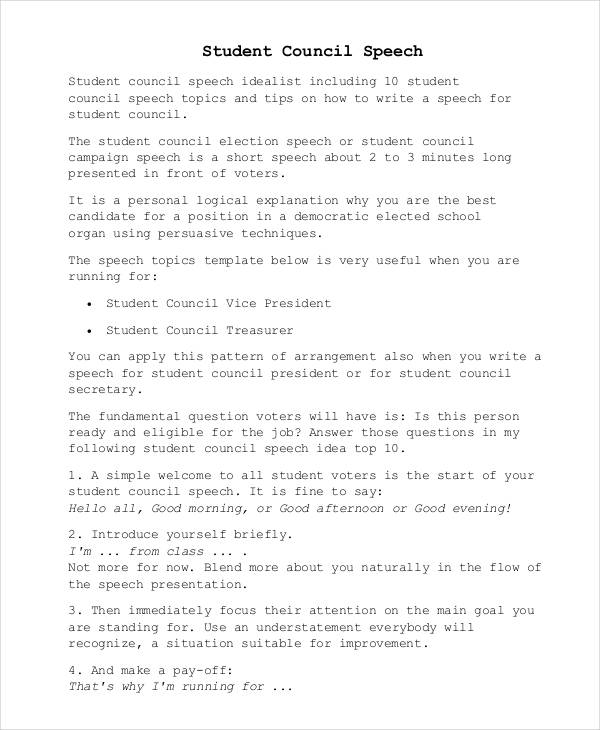
Size: 211 KB
Short Speech for Students
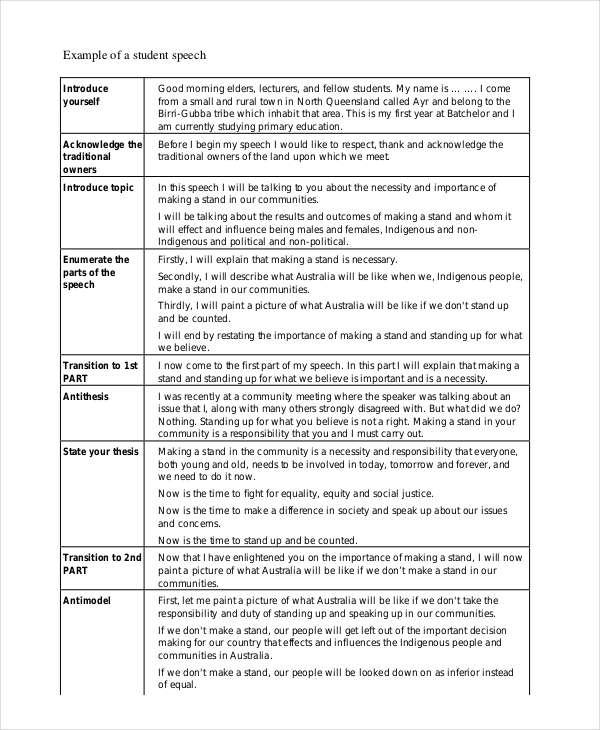
Size: 13 KB
Student Farewell Speech
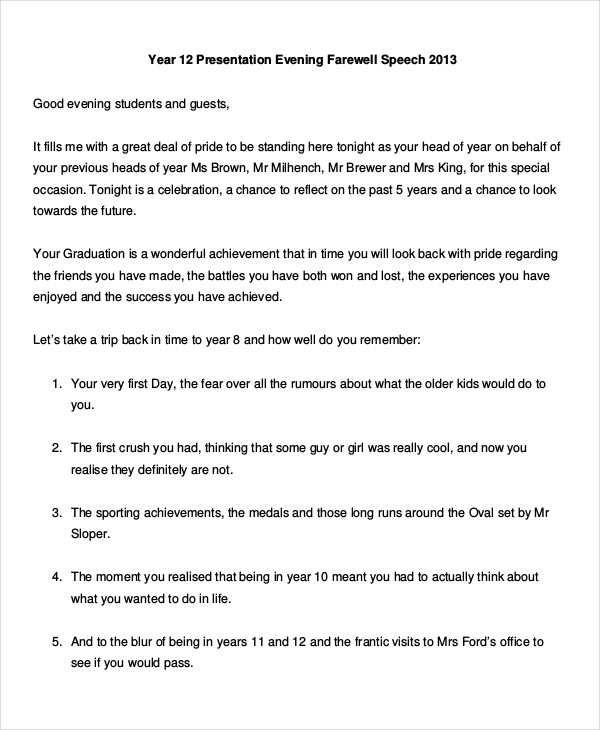
Size: 389 KB
How Is a Student Speech Different from a Regular Speech?
Students are often asked to deliver a speech in front of the class or even the entire student body. This could be to present, inform, or inspire an audience. A student’s speech is usually meant to be straightforward and simple. They aren’t meant to be complex and they follow the standard structure of speech outline templates.
Why Have Student Speeches?
Students are often encouraged to exercise their freedom of speech. It promotes communication and interaction between individuals. This allows them to express their thoughts and protest against actions properly. A speech can help develop a student’s logical reasoning, and it allows them to ponder on various topics and provide insights on what they have learned. It’s also a way for students to continuously gain confidence in themselves. You may also see presentation speech examples & samples.
Furthermore, a student’s speech is often addressed to fellow students and other members of the academe. With this in mind, it allows the speaker to connect with the audience and build a relationship through the speech being delivered. For instance, in an introduction speech , students can be creative with their way of delivering. This is to give meaning and purpose to the speech instead of it seeming as a lecture.
Student Award Example

Size: 35 KB
Graduation Speech
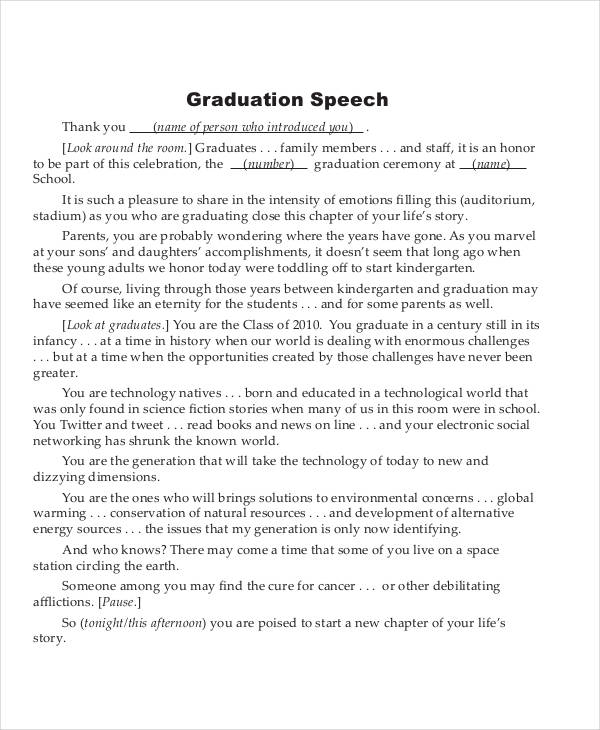
Size: 136 KB
Inspirational Student Example

Size: 85 KB
How to Conclude a Student Speech
Student speeches vary in type. Some can be inspiring, such as a graduation speech , while others are simply informative. But creating these types of speeches can be tough. You deliver the speech to a group that you encounter on a daily basis, the type of individuals whose attention span is said to be about 10 to 15 minutes long.
There are various speech examples that tell you how to start a speech but there isn’t much attention given on how to end it. It’s important to keep in mind that your last words will linger in the minds of your listeners making it your last opportunity to leave an impact. Here are a few ways for you to do so:
- Tell a brief story . It should illustrate the main points of your speech.
- Summarize key points . This is to remind your audience of the purpose of your speech. There might have been points that your listeners zoned out on, so it’s good to give them a brief run through of what was covered. You may also like steps in speech composition .
- A call to action . Presenting a challenge to an audience will always leave them thinking. Motivate them with encouraging words and a strong energy.
Speech Generator for Students
Text prompt
- Instructive
- Professional
Create a speech for students on achieving academic success
Help me write a speech for students on the power of perseverance
Enhancing Your Speech Writing Skills as a Student: The Key to Powerful Public Speaking

No votes yet

Public speaking often evokes discomfort and distress. These feelings will resonate with those who have faced this daunting task. But despite the anxiety it may induce, communicating effectively is an essential skill. It's necessary for various aspects of our lives and professional endeavors.
Regrettably, public speaking is often not taught enough in schools. Also, many parents undervalue its significance. However, both schools and parents should learn to recognize its value. Neglecting improving public speaking skills is unwise. Such skills play a pivotal role in ensuring their children's development.
This article explores the importance of empowering students' speech-writing skills. By examining this subject, we can shed light on the immense value of the skills. We'll highlight the value of helping students to excel in public speaking engagements.
Consider Seeking Reliable Resources for Speech Writing
Speech drafting is an indispensable component of eloquent public speaking. It's pivotal in organizing and structuring your thoughts. It enables a speaker to convey opinions clearly and persuasively. Thus, every writer needs to craft the content and flow of a talk meticulously to engage and captivate their audience, and ensure their message resonates.
In compiling a speech, seeking valuable resources is pivotal. Studydriver.com is an excellent platform to consider when seeking valuable essay resources. Here you can find a great database with free pre written essays , offering valuable insights and free essay examples to help you with challenging assignments. Using this resource, learners can find inspiration and explore free essays online on public speaking. It also helps them to gain a deeper understanding of effective public speaking techniques.
The availability of free essays, papers, theses, and essay example introductions is crucial for learners. It allows you to analyze and learn from past well-written speeches, facilitating your growth as a proficient speech writer.
Lifelong Benefits of Attaining Speech Writing Skills
Mastering speech writing brings lifelong benefits that extend beyond public speaking. These include:
Create new engagements: Strong speech writing prowess empowers you to engage. As a result, fostering meaningful conversations and social connections.
Boost critical thinking: The writing process requires you to analyze and synthesize information. The approach enhances your critical thinking abilities. It enables you to present well-reasoned arguments.
Improve confidence: Gain confidence by expressing yourself in writing. You will also develop fruitful communication expertise that transcends public speaking scenarios.
How Developing Your Writing Skills Increases the Effectiveness of Your Public Speaking
Mastering strong speech writing skills directly contributes to your public speaking effectiveness by:
Enhancing clarity and coherence: Proficient writing helps to structure your speeches logically. As a result, you will develop a clear and coherent flow of views for your audience to follow.
Strengthening organization: Writing will help you organize your thoughts, enabling you to present yourself systematically and cohesively.
Improving language proficiency: You will enhance your vocabulary, grammar, and sentence construction. This will help you deliver speeches with precision and eloquence.
Fostering creativity: Regularly writing will encourage you to think creatively and craft engaging introduction parts, compelling arguments, and memorable conclusions.
Promoting effective delivery: Develop outlines that structure your delivery, and ensure smooth transitions between key points.
The Key Elements of Impactful Speech Writing
To craft impactful speeches, students should consider the following key elements:
Select a Significant Subject
Choose a relevant, engaging, and meaningful topic for speaker and audience, to ensure that the talk resonates with the audience.
Analyze Your Target Audience
Understand attendees' characteristics, interests, and needs, and tailor the address accordingly. Considering their perspective is vital. It allows you to deliver relatable and relevant content to the audience, as a result, increasing their engagement.
Develop an Organizational Framework
Create a clear and logical structure for the speech. It must include an introduction, body, and conclusion. Each section should have a clear purpose and seamlessly transition to the next. Following that approach ensures a coherent flow of views leading to the conclusion.
Start with a Compelling Argument
Grab the audience's attention from the introduction through to the conclusion. Achieve that by starting with a compelling argument, anecdote, or thought-provoking question. This sets the tone for the speech and creates anticipation for what is to come.
Employ Specific Examples and Visual Enhancements
Support arguments and views with specific examples, statistics, and visual aids. This enhances your credibility. It also helps the audience visualize and understand the concepts being presented.
Incorporate a Personal Touch
Infuse the speech with personal experiences, anecdotes, or emotions. Doing that is crucial to establish a connection with the audience. This adds authenticity and makes the message more relatable and engaging.
Explore Rhetorical Devices
Utilize rhetorical devices such as repetition, parallelism, and alliteration. These devices add impact and emphasize key points. They, further, make the talk more memorable and persuasive.
Conclude with Impact and Make a Lasting Impression
Summarize the main points. Also, write a strong concluding statement or call to action. This will ensure that the talk ends on a powerful note, leaving a lasting impression on the audience.
The Role of Speech Writing in Student Success
Strong speech-writing and critical thinking skills play a pivotal role in students' success. Writing well-crafted speeches enhances learners' ability to present their research, ideas, and arguments. This contributes to their school performance. It also prepares them for future conferences, debates, and social media presentations.
In professional settings, speech writing skills will enable you to communicate confidently. It will help you persuade colleagues, clients, or superiors. Thus, speech writing competency will enhance your professional reputation and attract new opportunities. Strong speech-writing ingenuity is an asset that will set you apart in higher education, enabling you to excel in various domains and make a positive impact in your chosen field.
As a student, speech-writing prowess is necessary for potent public speaking performance. Various valuable resources like Studydriver.com can help you enhance your speech-making abilities. Also, grasping strong speech-writing expertise offers lifelong benefits. These include creating new engagements, boosting critical thinking, and improving confidence. Speech writing mastery significantly increases the effectiveness of public speaking, facilitating clear organization, successful delivery, and engaging content.
Disclaimer: this article includes a paid product promotion.

How to Give Talks as a Software Developer: A Closer Look

How to Write an Informative Speech in 12 Easy Steps

3 Public Speaking Strategies for Environmental Conservationists

- Ford’s Shop

Original Speech Writing
Students write eight original speeches.
Rubrics and example speeches are included. Each speech performance focuses on using two Podium Points (elements of effective public speaking).
Common Core Standards
CCSS.ELA-LITERACY.W.8.1
Write arguments to support claims with clear reasons and relevant evidence
Classroom Activities
- Classroom Activity One: Introductory Speech Students write and present a speech introducing themselves using Presence.
- Classroom Activity Two: Brown Bag Speech Focusing on Pace and Volume, students share an item that is important to them.
- Classroom Activity Three: Storytelling Speech Tone and Emphasis are stressed in this speech where students tell a true story that happened to them.
- Classroom Activity Four: Tribute Speech Each student honors someone in his/her life while working on improving Eye Contact, Enunciation and Diction.
- Classroom Activity Five: “Read to Me Speech” After picking a favorite text, students return to Emphasis and Tone in order to share a selection with the class.
- Classroom Activity Six: Book Speech Posture and Gesture are introduced to students through a speech on a favorite book.
- Classroom Activity Seven: Teaching Speech In this activity, students must use all Podium Points while teaching the class a new skill.
- Classroom Activity Eight: This I Believe Using all Podium Points, students need to share their personal philosophy with the class.
Teacher Preparation:
Catherine Plumb-Sperry is a sixth-grade reading teacher at James Bridger Middle School in Independence, MO. Over the course of a year, her students write and perform an original speech each month. This lesson gives teachers framework for how to structure eight different speeches. Catherine’s most important tips for successfully implementing this in the classroom:
- Students do not have the option to “opt-out” of giving a speech. The teacher should perform a sample speech on the day that each speech is assigned.
- When delivering a sample speech, pick a few moments to intentionally ignore one of the Podium Points, so that students can hone their observation skills.
- Starting with Lesson Activity One, model Warm and Cool Feedback.
- Focus on two Podium Points for each speech. However, once a Podium Point has been the focus of a speech, students must continue to work on that element in all subsequent speeches. The Podium Points are cumulative as they progress through the school year.
- It takes about three 45-minute class periods for a class of 25 students to give their two-minute speeches and receive Warm and Cool Feedback.
- Do not time speeches until the Tribute Speech. It’s better for students to have the first three speech opportunities to stand and speak in front of the class without the added pressure of a time limit.
Additionally, Catherine believes that a podium is a necessary classroom accessory when teaching oratory. Students need to be accustomed to speaking from and using a podium. The podium is also a visual aid indicating that when someone stands to speak, we listen.
Classroom Activity One
Introductory speech.
The first speech of the year is untimed. Catherine usually does the speech on the third day of school. Students cannot use notes of any kind.
The podium point being evaluated is presence: Can you walk to the podium confidently (even if you don’t feel confident) and use a greeting?
Students are expected to:
- Have presence: walk to the podium confidently and stand confidently throughout their speech.
- Greet their audience.
- Sentence one – Tell their complete name.
- Sentence two – Tell us something about their family.
- Sentence three – Tell us something unique about them.
- End with a “thank you.”
After the speech, the students in the audience spend two minutes giving warm and cool feedback.
Classroom Activity Two
Brown bag speech.
This speech is very similar to “show-and-tell” from early elementary school.
Students are each given a brown lunch sack. They write the speech requirements on it. They bring it home that night, and select an item to share with the class for their speech. The item must fit in the sack, and may not be a previously living or presently living item. Students bring the item in the sack to school the next day.
The two Podium Points added to this speech are volume and pace. Nerves cause speakers to speak quickly so pace is a challenge. Introduce pace early in the process so student have many opportunities to practice speaking at an appropriate pace.
- Have presence.
- Use appropriate pace and volume.
- Select an item to share.
- Walk the item around and show it to the class.
- Return to the podium to speak.
- Greet the audience. describe where the item came from, what it is used for, why it is significant to them, why they like it, or any other information they want us to know.
- Ask the audience if they have any questions.
- End their speech with a “thank you.”
After the speech, the class spends two minutes giving warm and cool feedback.
Classroom Activity Three
Storytelling speech.
In this speech, students tell a story from their life. It must be something they are comfortable sharing in front of the class.
The two podium points that are the focus of this speech are tone and emphasis. Students are telling stories that may contain strong emotion, so this is a natural way for them to add tone and emphasis. Students should write their speech down and identify the tone they are trying to achieve. They should also highlight or circle any words they are going to emphasize. They will use the written text to rehearse, and then turn in the text before giving their speech.
Students are expected to
- Use appropriate pace, volume, tone and emphasis.
- Greet the audience.
- Tell a story with a distinct beginning, middle and end.
- Have the story memorized.
Classroom Activity Four
Tribute speech.
In this speech, students are telling the class about an important person in their life, and why they admire this person.
Encourage students to bring a photograph of their person. A photograph gives the audience a nice visual reference during the speech.
The two podium points that are the focus of this speech are eye-contact and diction. Students may use a script when delivering this speech. A caveat: because a script is allowed, students may tend to read to the audience. It takes a high level of skill to have a script and still make eye contact. Students are expected to rehearse their speech at home before the speech performance day. Assign a rehearsal log to ensure that students practice before their performance.
Teach tongue twisters in class to support development of diction. Students can practice these tongue twisters at home when rehearsing their speech. On speech performance day, the class can warm-up using the tongue twisters. Starting off class this way may also alleviate nerves, as tongue twisters can be fun and promote a bit of laughter.
This is the first speech where speeches are timed. Speeches must be at least one minute and no longer than two minutes. Discuss time with the students but do not use it as an evaluation criteria.
- Use all previously learned Podium Points.
- Use eye-contact and diction.
- Section One: Tell who the person is, what their relationship is to the student, and why the student admires them. The student might also describe physical traits.
- Section Two: Give a personality trait the person has. Students must give two examples of the person showing the trait. (If he says a person is kind, he must say two ways that they show kindness.)
- Section Three: Give a second personality trait that the person has. The student must also give two examples of the person showing the trait.
- Conclude by restating in a different way from their introduction why the person is so special to them.
- End their speech with “thank you.”
Classroom Activity Five
“read to me” speech.
Note: It might be helpful to pair this with the Refining Tone and Emphasis Lesson.
In this speech, the students read a piece of text written by someone else. The text can be lyrics from a song, a story or a poem. The Podium Points that are the focus of this speech are emphasis and tone. Although these Podium Points have been covered in the past, the content of this speech requires “extra” attention to tone and emphasis when delivering the speech. Students should make a deliberate effort to put emotion into their delivery.
To find a text to read for performance, students may search online to find song lyrics, a story or poem that they connect with emotionally. They should cut and paste this text into a Word document. Students should read the text carefully to understand the message of the text, and determine the emotional tone. They should annotate their text by circling words they think best express the meaning and tone, and practice emphasizing those words when saying it aloud. Students should bring their annotated text with them to the podium for reference.
Speeches are timed and should be between one and maximum two minutes long.
- Use all previously learned Podium Points, with extra effort to demonstrate tone and emphasis.
- Credit the source of their reading.
- Make an effort to memorize as much of their text as possible and only use their scripts as reference.
After the speech, students are expected to explain briefly how they employed tone and emphasis to convey the meaning of their speech. The class then spends two minutes giving warm and cool feedback.
Classroom Activity Six
Book speech.
In this speech, students review a book they’ve read during the school year.
The Podium Points added for this speech are gesture and posture. Students need to demonstrate confident posture. Confident posture includes standing up tall, without slouching, feet firmly on the floor, no rocking or fidgeting. Shoulders should be back and down. Students can be prompted to squeeze their shoulder blades together, or imagine that they are tucking their shoulder blades into the back pockets. The goal is to open the chest up, without puffing it out, so that students can breath properly and look confident.
They also should use gestures to emphasize the important parts of the speech or to engage the audience. Remind students that gestures should be as natural as possible. As a frame of reference, it may be helpful to demonstrate examples of natural gestures, or play clips of famous orators and have students observe their gestures.
Students are required to use a visual aide for this speech. They have the choice between creating the visual aide (e.g. a poster advertising the book) or bringing in an item related to the topic of the book (e.g. for a baseball book, a news article from the same time period as the book, or memorabilia that relates to the book). Using the visual aid is an easy way for students to include gesture into a speech.
This is a timed speech and should be between two and three minutes.
- Use all of the Podium Points learned previously.
- Use gestures and have confident posture.
- Discuss the literary elements of the book: main character, theme and plot (without giving away the ending). Share if they liked or didn’t like the book, and offer reasons why.
- Have confident posture, with feet solidly on the floor, standing calmly.
- Use gestures.
- Show their visual aid and explain how it relates to the book. The visual aid must add to the understanding of the book or author of the book.
- Ask if there are any questions about the book.
- End the speech with “thank you.”
After the speech, students spend two minutes giving warm and cool feedback.
Classroom Activity Seven
Teaching speech.
In this speech, students teach something to the entire class. To help students decide their lesson topic, offer some suggestions. This helps students to focus their ideas, so they select something they will feel confident teaching. Some suggestions: origami, how to draw something, a sports strategy, how to do a card trick, a dance step or a simple craft project.
By lesson seven, all of the Podium Points have been introduced. Students are now assessed on their use of all Podium Points and speech requirements.
This is a timed speech and should be between three and five minutes.
- Use all of the Podium Points.
- Include what the class will be learning in their speech introduction.
- If teaching a step-by-step lesson, circulate around the room to assist classmates when needed.
- Provide all the required materials, enough for every student.
- Answer any questions the audience might have.
Classroom Activity Eight
This i believe.
In this speech, students speak about a topic important to them. This speech introduces students to the art of persuasive speech. Students should be encouraged to think about what matters to them, and to select a topic they feel passionately about. As they write their speeches, students should consider what they want the audience to know, understand and do about the topic as a result of listening to their speech. The speech must include a call to action to the audience.
This is speech includes a research component, to help students understand their issue, find evidence to support their belief, and learn about any opposing points of view. Students will need to be provided with time for research. Length of instructional time dedicated conducting research should be determined according to grade level and how much time the school curriculum will allow.
After researching the topic, the writing process begins. In-class time devoted to writing should be a minimum of three days. Consider a process that includes students writing drafts, editing and rewriting. This I Believe has an excellent teaching guide on how to help students write their own statements.
Our original speech writing lesson also has several useful techniques for helping students write their own speeches.
This is a timed speech and must be at least 1 minute 50 seconds, and no longer than 2 minutes 10 seconds.
- Include a personal belief.
- Share a personal story to highlight their belief.
- Explain why this topic is important to them.
- Include a call to action.
Each speech includes an individual rubric for assessment.
- Speech Topics For Kids
- How To Write A Speech
How to Write a Speech: A Guide to Enhance Your Writing Skills
Speech is a medium to convey a message to the world. It is a way of expressing your views on a topic or a way to showcase your strong opposition to a particular idea. To deliver an effective speech, you need a strong and commanding voice, but more important than that is what you say. Spending time in preparing a speech is as vital as presenting it well to your audience.
Read the article to learn what all you need to include in a speech and how to structure it.
Table of Contents
- Self-Introduction
The Opening Statement
Structuring the speech, choice of words, authenticity, writing in 1st person, tips to write a speech, frequently asked questions on speech, how to write a speech.
Writing a speech on any particular topic requires a lot of research. It also has to be structured well in order to properly get the message across to the target audience. If you have ever listened to famous orators, you would have noticed the kind of details they include when speaking about a particular topic, how they present it and how their speeches motivate and instill courage in people to work towards an individual or shared goal. Learning how to write such effective speeches can be done with a little guidance. So, here are a few points you can keep in mind when writing a speech on your own. Go through each of them carefully and follow them meticulously.
Self Introduction
When you are writing or delivering a speech, the very first thing you need to do is introduce yourself. When you are delivering a speech for a particular occasion, there might be a master of ceremony who might introduce you and invite you to share your thoughts. Whatever be the case, always remember to say one or two sentences about who you are and what you intend to do.
Introductions can change according to the nature of your target audience. It can be either formal or informal based on the audience you are addressing. Here are a few examples.
Addressing Friends/Classmates/Peers
- Hello everyone! I am ________. I am here to share my views on _________.
- Good morning friends. I, _________, am here to talk to you about _________.
Addressing Teachers/Higher Authorities
- Good morning/afternoon/evening. Before I start, I would like to thank _______ for giving me an opportunity to share my thoughts about ________ here today.
- A good day to all. I, __________, on behalf of _________, am standing here today to voice out my thoughts on _________.
It is said that the first seven seconds is all that a human brain requires to decide whether or not to focus on something. So, it is evident that a catchy opening statement is the factor that will impact your audience. Writing a speech does require a lot of research, and structuring it in an interesting, informative and coherent manner is something that should be done with utmost care.
When given a topic to speak on, the first thing you can do is brainstorm ideas and pen down all that comes to your mind. This will help you understand what aspect of the topic you want to focus on. With that in mind, you can start drafting your speech.
An opening statement can be anything that is relevant to the topic. Use words smartly to create an impression and grab the attention of your audience. A few ideas on framing opening statements are given below. Take a look.
- Asking an Engaging Question
Starting your speech by asking the audience a question can get their attention. It creates an interest and curiosity in the audience and makes them think about the question. This way, you would have already got their minds ready to listen and think.
- Fact or a Surprising Statement
Surprising the audience with an interesting fact or a statement can draw the attention of the audience. It can even be a joke; just make sure it is relevant. A good laugh would wake up their minds and they would want to listen to what you are going to say next.
- Adding a Quote
After you have found your topic to work on, look for a quote that best suits your topic. The quote can be one said by some famous personality or even from stories, movies or series. As long as it suits your topic and is appropriate to the target audience, use them confidently. Again, finding a quote that is well-known or has scope for deep thought will be your success factor.
To structure your speech easily, it is advisable to break it into three parts or three sections – an introduction, body and conclusion.
- Introduction: Introduce the topic and your views on the topic briefly.
- Body: Give a detailed explanation of your topic. Your focus should be to inform and educate your audience on the said topic.
- Conclusion: Voice out your thoughts/suggestions. Your intention here should be to make them think/act.
While delivering or writing a speech, it is essential to keep an eye on the language you are using. Choose the right kind of words. The person has the liberty to express their views in support or against the topic; just be sure to provide enough evidence to prove the discussed points. See to it that you use short and precise sentences. Your choice of words and what you emphasise on will decide the effect of the speech on the audience.
When writing a speech, make sure to,
- Avoid long, confusing sentences.
- Check the spelling, sentence structure and grammar.
- Not use contradictory words or statements that might cause any sort of issues.
Anything authentic will appeal to the audience, so including anecdotes, personal experiences and thoughts will help you build a good rapport with your audience. The only thing you need to take care is to not let yourself be carried away in the moment. Speak only what is necessary.
Using the 1st person point of view in a speech is believed to be more effective than a third person point of view. Just be careful not to make it too subjective and sway away from the topic.
- Understand the purpose of your speech: Before writing the speech, you must understand the topic and the purpose behind it. Reason out and evaluate if the speech has to be inspiring, entertaining or purely informative.
- Identify your audience: When writing or delivering a speech, your audience play the major role. Unless you know who your target audience is, you will not be able to draft a good and appropriate speech.
- Decide the length of the speech: Whatever be the topic, make sure you keep it short and to the point. Making a speech longer than it needs to be will only make it monotonous and boring.
- Revising and practicing the speech: After writing, it is essential to revise and recheck as there might be minor errors which you might have missed. Edit and revise until you are sure you have it right. Practise as much as required so you do not stammer in front of your audience.
- Mention your takeaways at the end of the speech: Takeaways are the points which have been majorly emphasised on and can bring a change. Be sure to always have a thought or idea that your audience can reflect upon at the end of your speech.
How to write a speech?
Writing a speech is basically about collecting, summarising and structuring your points on a given topic. Do a proper research, prepare multiple drafts, edit and revise until you are sure of the content.
Why is it important to introduce ourselves?
It is essential to introduce yourself while writing a speech, so that your audience or the readers know who the speaker is and understand where you come from. This will, in turn, help them connect with you and your thoughts.
Leave a Comment Cancel reply
Your Mobile number and Email id will not be published. Required fields are marked *
Request OTP on Voice Call
Post My Comment
- Share Share
Register with BYJU'S & Download Free PDFs
Register with byju's & watch live videos.
Get in touch with us
Are you sure you want to logout?
Please select your grade.
- Earth and space

Speech Writing: Introduction with Examples
What is a speech.
- A speech is a formal address delivered to an audience.
- It always has a purpose. It aims to convey the purpose with logically connected ideas.
- Speech writing is a method of telling a thought or message to a reader using correct punctuation and expressions.
While writing a speech we should concentrate on the three ‘ C’ s.
Your speech should be clear, concise, and consistent .
- Clear: The speech should be simple and easy to understand.
- Concise: It should not be too long. Generally, the word limit is 150-200 words. But it may vary.
- Consistent: The speech should be logically in order.
Let’s see the format of speech writing.
It contains two parts.
Title: Give a good title to the topic while writing a speech.

Content: The content section is divided into 3 subparts.
- Introduction
1. INTRODUCTION:
Start greeting the audience with the phrases like:
- Respected Sir/Ma’am
- Dear students
- Good morning, everyone
Share your personal introduction in one or two lines.
Then write in brief what is the theme of the speech.
- Explain the topic in detail.
- Be clear and specific about your thoughts.
- We can use 3 techniques while writing a speech.
Advantage & Disadvantage
Cause & Effect
Problem & Solution
Let’s learn them in detail.
Advantages & Disadvantages:
- Tell the advantages and disadvantages of the thing.
- Example: If the topic is ‘online education’, you can write its benefits and side effects.
Cause & Effect:
- Write why it is happening or the cause of the thing given in the speech.
- What is its effect on society?
- Example: If the topic is ‘ pollution ’, you can write its cause and effect on the earth.
Problem & Solution:
- Discuss the problem and write the proper solution to it.
- Write the need for that thing in your daily life.
3. CONCLUSION:
- Conclude the speech by giving an overall view or summary.
- Add the specific action you want the audience to do right away.
Some important things you must keep in mind while writing a speech.
- Figure out the primary point of the speech.
- Identify the audience who will listen to the speech.
- Give proper support and structure to the speech.
- Make sure to use correct punctuation while writing.
Sample of Speech:
Good morning respected principal sir, all the teachers, and my dear friends.
Today we have gathered here to celebrate the Teachers’ Day.
First, I would like to wish all my respected teachers a very happy Teachers’ Day. Thank you for being
our backbone and support. Teachers play a big role in building the character of students. They give
us knowledge and help in achieving our dreams. They are our guiding spirits and role models.
Teachers help in building the character of students. Teachers plays an important role in the education
of students, society, and country.
On behalf of all students, I would like to thank all the teachers for their tireless efforts they make to give us knowledge and shape our future.
Another Example of Speech :
Write a speech on “Importance of Education” which you will deliver in your school.
Good morning respected teachers and my dear friends.
I am Linda studying from grade 3.
The topic of my speech is ‘Importance of Education’. I would let you know all about the value of education and its contribution to our lives.
Education helps us to remove doubt and fear of challenges in our lives. We can say it is a tool that keeps us happy and give courage to fight in difficult situations. We need education to make ourselves confident and to be aware of equality. It makes us self -dependent. Education shape us for the future challenges in life. It helps you to earn money to fulfill the basic need of life.
If we are not properly educated, we may face challenges in some situations. Education is not about gaining knowledge only; it means learning the ways to be happy and social life.
My dear friends, education is like a healthy food that nourishes us both internally and externally. It gives us confidence by developing our personality. We should help others as well as ourselves to be educated and contribute to the development of the society.
Thank you!!!

Related topics

Exploring the World of Adjectives: Types, Usage, and Examples
What are Parts of Speech? Parts of speech determine words’ grammatical and semantic position in a sentence. Activity time The parts of speech are nouns, adverbs, conjunctions, pronouns, interjections, adjectives, articles, prepositions, and verbs. Identify the parts of speech of the underlined words in the following sentences. White- Adjective Big- Adjective Exciting- Adjectives New- […]

Memoir Writing: Basic Elements, Structures, and Types
Memoir: A memoir is a narrative written from an author’s perspective about a particular facet of his/her own life. ‘Memoir’ word comes from the French word ‘memoire’, which means ‘memory’ or ‘reminiscence’. Example Night: Elie Wiesel gives an account of how he survived his teenage years at Auschwitz and Buchenwald concentration camps during World War […]
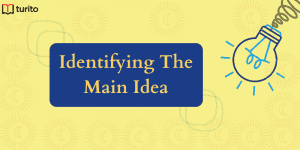
Identification of Main Idea in Fiction and Non-fiction
Every story or paragraph or non-fictional text has at least one main idea. The MAIN IDEA is what the text is mostly about. (It is backed up or supported by SUPPORTING DETAILS) Before discussing how to find the main idea, we shall first look at TOPIC. Can you define a topic? A topic can be […]

Writing an Article: Structure and Essential Tips
What is an article? Structure of Article Writing : Title : Draw the attention of readers with an attractive title and indicate the main topic of the article Introduction : Attract the reader’s attention with a sentence that gives a general presentation of the topic. Main Body : Between these sentences, the body should do […]

Other topics

How to Find the Area of Rectangle?

How to Solve Right Triangles?

Ways to Simplify Algebraic Expressions

It’s More than an Argument: How Speech Writing Supports Student Agency
Writing is an essential life skill, particularly in an age where much of our communication is taking place via text-based channels like emails, social media and blog posts. Beyond communication however, writing, and specifically speech writing, offers students an opportunity to nurture their voice, express their thoughts and opinions, and increase their agency, both in the classroom and in their communities.
Cultivating Student Voice, Creating Student Agency
Simply put, student agency is all about giving students a voice and choice in how they learn . It gives them the chance to be active agents in their own education . There are a multitude of reasons why giving students agency is beneficial , and ways in which we can work to elevate student voices in our classrooms .
In the English Language Arts (ELA) classroom, writing is a powerful tool that can encourage students to find their voice and use it. Indeed, voice is one of the most important elements of good writing, that conveys to the reader who the writer is and what they stand for .
Yet, too often, students are not given the opportunities to cultivate their own unique voice, and end up producing poor imitations of others’ work – and along the way, feel robbed of their agency and ability to learn in a way that suits them best. Creative writing using “what if” prompts or open-ended narratives, image writing based on single or multiple pictures, and writing responses to text-based information are all ways in which we can help our students develop their voice.
For students in middle school, speech writing can also be included in ELA lessons as a powerful tool to teach students how to instil their voices in their writing, while at the same time increasing their agency. Voice is most easily captured in the spoken word, hence speech writing easily lends itself to helping students discover their unique ways of expressing themselves.
As educators, we are well aware that each student learns, grows and expresses themselves in different ways. Speech writing helps solidify the belief in our students’ minds that their voice matters, by helping them feel confident in the way they express themselves. This confidence also translates into other areas of their lives, including giving them agency to learn in a way that best suits their abilities and style, as well as to undertake projects in their community.
Teach Speech Writing Using Read to Lead
Instilling our students with the skills to write a great speech may feel like a daunting task. Read to Lead has some useful resources to get started.
The Read to Lead learning games offer a variety of close reading and literacy skill-building lessons to help students build their literacy and leadership skills. These lessons aim to achieve objectives such as being able to read closely to make inferences, cite evidence, interpret words and phrases, analyze word choice, and evaluate content.
As a complement to the game Community in Crisis , the Read to Lead platform features a collection of speeches delivered by political figures. These close reading lessons expose students to authentic speeches and give them a taste of what it means to have their own unique voice. Students also have a chance to learn more about concepts such as cooperation, responsibility and perspectives, particularly in the context of serving a community.
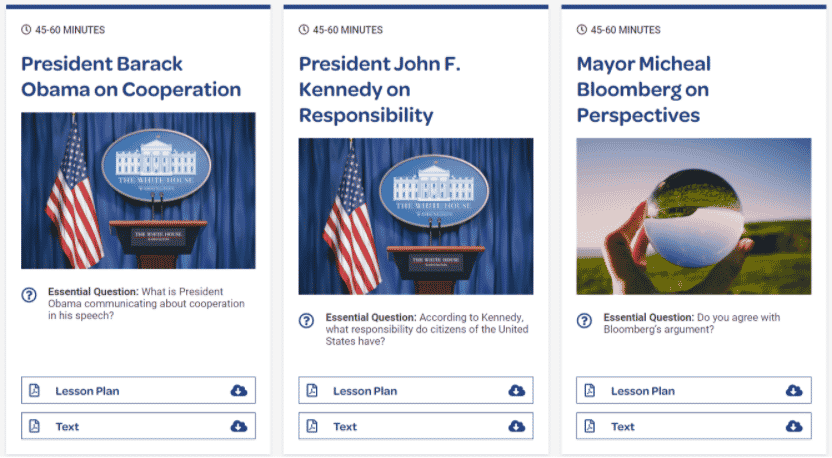
Building on this, the game Vital Signs is designed to fulfill College and Career Readiness Anchor (CCRA) Standards through close reading of a diverse collection of articles. Topics include non-violent resistance, the water crisis in Flint, Michigan, and anti-bullying efforts, and relate directly to needs or problems students may encounter in their own communities.
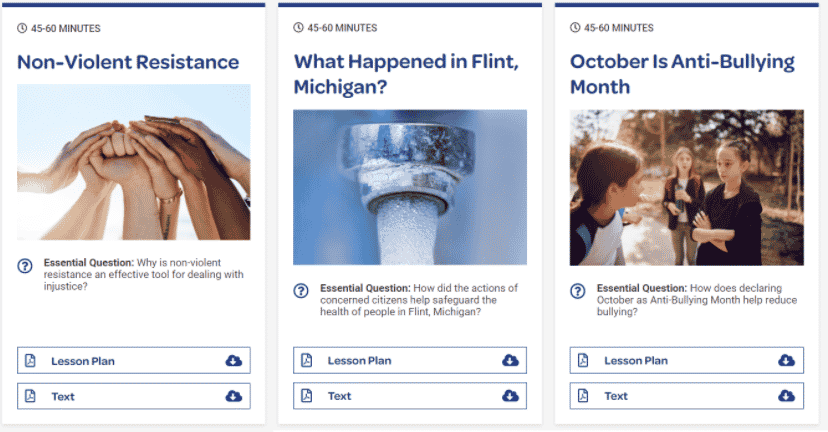
These lessons are easily adapted to teach speech writing, by encouraging students to share their thoughts on relevant and relatable topics in a speech format. They can also hone their expressive skills by giving a rousing call to action, or seeking to inform and educate listeners on the topic. Beyond the classroom, these lessons can serve as a springboard for students to launch their own community projects that address real needs.
The Read to Lead platform was created with a flexible approach in mind, to allow these lessons to be used for in-person, remote, and hybrid class settings. As such, implementing these lessons in your classroom (whether virtual or in-person) is a breeze.
Student Agency Leads to Action
Building tomorrow’s leaders who have the confidence in their skills, abilities and voice starts in today’s classrooms. By incorporating lesson plans and activities that empower students to develop agency and connect with their communities, we can have an enormous impact on helping our students see their own potential for creating change. Click here to sign up for Read to Lead and give your students the confidence and agency to engage with their community!
About Read to Lead
Read to Lead uses the power of game-based learning to empower middle school students to build literacy, life, and career skills. Teachers can sign up for a free account to get started!
- Share on Facebook
- Share on Twitter
- Share on LinkedIn
- Share on Reddit
- Share on Pinterest
Teachers, sign up for free!
Ready to empower the next generation of readers and leaders? Sign up for a free account and start building your students' literacy, life, and career skills!
More in Blog Posts
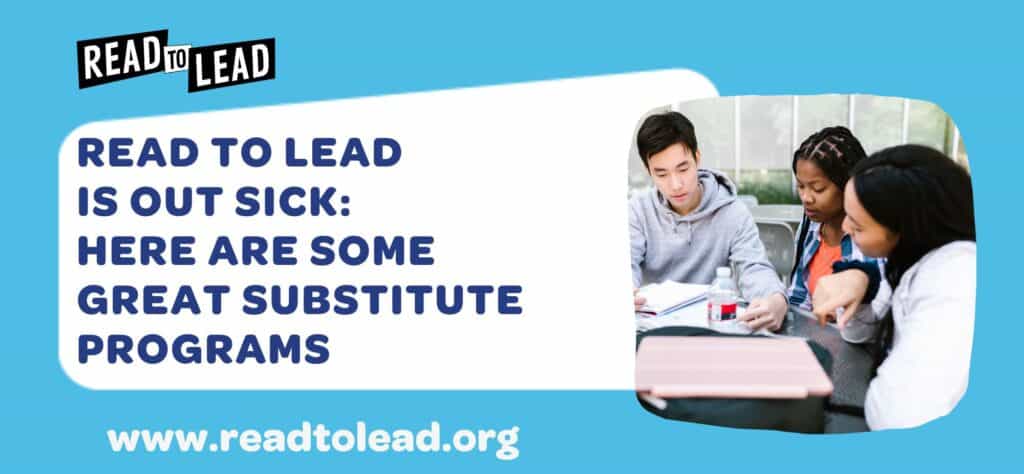
Read To Lead Is Out Sick: Here Are Some Great Substitute Programs
You may have heard that we’re closing our doors on December 31, 2022. We know we are leaving big shoes to fill in 2023. Where else can you find a program that builds literacy, life, career, and SEL skills, with engaging online learning games and comes complete with all the lesson plans, wrap-around curricula, project-based learning, and real-time data reports? Don’t worry, we’ve got you covered! As educators, we look out for each other - so we won’t leave you in the lurch. We’ve curated a list of our favorite resources you can tap into in the coming year. Check them out!

Review Games To Make Test Prep Fun
Testing prep time can feel like a chore and a real drag - not just to middle schoolers, but to teachers too! Why not switch it up? Turn test prep into a time that students enjoy while reviewing important topics and concepts by bringing an element of fun into your classroom!

Top Books to Promote Anti-Bullying
October is Bullying Prevention Month and as such we wanted to share a few reading resources to help students feel seen no matter what they’re going through.
We don't support Internet Explorer
Please use Chrome, Safari, Firefox, or Edge to view this site.
Speech Writing for Students
Delivering a speech is not an easy job. It requires confidence to speak in front of others. Every listener is not of the same kind. Speech varies from place-to-place and audience-to-audience. It can be a speech in the general public, it can be during the school assembly or even in the office on some particular occasion.
To be precise, a speech is a formal talk given by a person to an audience. Quite similar to a debate, the speaker expresses his/her strong opinions about an issue with the purpose to convince the listeners to understand his/her point of view.
Speech Format
Introduction : Begin the speech with a meaningful quote or statement or by sharing a personal experience, which is relevant to the topic of the speech. Once you have the audience’s attention, formally address the chief guest, fellow presenters and members of the audience. Eventually, introduce the topic of speech.
The Topic: Make the speech impactful by including logical arguments and substantiating his/her views with pertinent facts and examples. The language used also plays an important role. The speaker must use formal, powerful language.
Summation: While summing up the speech the speaker must highlight the most important points. He/she can even suggest relevant solutions to problem discussed in the speech.
Conclusion: The speech must end either with an appeal, a request, a warning or with a call for action. But, it must end on a positive note. Say ‘Thank you’ at the end of speech.
Speech Writing Topics
- Speech on Aggressive Behaviour of Students in School
- Speech on Balancing Academics and Sports
- Speech on Beauty of India Lies in Its Diversity
- Speech on Benefits of Early Rising
- Speech on Careful Use of Mobile Phones
- Speech on Cleanliness is Next to Godliness
- Speech on Cleanliness is the Responsibility of All
- Speech on Corruption
- Speech on Corruption, Its Causes and Solutions
- Speech on Curbing Corruption
- Speech on Democracy and Discipline
- Speech on Discipline Shapes the Future of a Student
- Speech on Dowry is a Blemish in the Name of Indian Society
- Speech on Each One, Teach One
- Speech on Environmental Pollution
- Speech on Evils of Dowry System
- Speech on Farewell Party for Seniors
- Speech on Games Are Very Necessary for Holistic Growth
- Speech on Gandhi Jayanti
- Speech on Growing Violence Among Children
- Speech on Hazards of Fast Food
- Speech on Health Care for Indian Workers
- Speech on Healthy Food
- Speech on How Media Influences Public Opinion
- Speech on How Students Can Help Flood or Drought Victims by Collecting Clothes, Money, and Medicines
- Speech on Ill Effects of Watching Too Much Television
- Speech on Impact of Yoga in Our Life
- Speech on Importance of Civic Sense
- Speech on Importance of Discipline in Life
- Speech on Importance of Power in Our Daily Life and How to Save It
- Speech on Importance of Prayer in the Morning at School
- Speech on Importance of Trees
- Speech on Increasing Rate of Crime in Today’s Society
- Speech on Indiscipline in Schools
- Speech on Keeping the School Neat and Clean
- Speech on Library Plays an Important Role at School
- Speech on Machines Are Good Slaves But a Bad Master
- Speech on Martyrs’ Day
- Speech on Modernisation Does Not Mean Aping Westernisation
- Speech on Persuading Students to Make Use of Indoor Facilities
- Speech on Protection from Mosquitoes
- Speech on Role of Women
- Speech on Safe Driving
- Speech on Slow and Steady Wins the Race
- Speech on Student and Sportsmanship
- Speech on Student Must Know How to Manage Time
- Speech on Terrorism
- Speech on The Importance of Water
- Speech on Water is Precious, Use it Wisely
- Speech on Why Holi is Played and How It Should Be Played
- Speech on Why Should Students Obey their Elders
- Speech on World Environment Day
- Speech on Yourself – Describing Strengths and Weakness
- Speech on Youth, Their Problems and Solutions
Try aiPDF , our new AI assistant for students and researchers
Speech Writing
Speech Examples
20+ Outstanding Speech Examples for Your Help
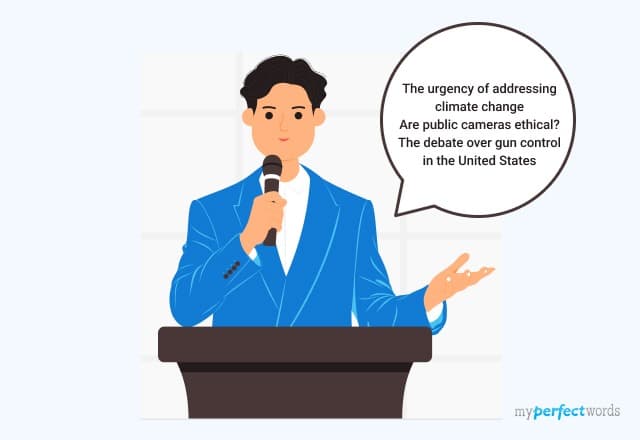
People also read
The 10 Key Steps for Perfect Speech Writing
Understanding the Speech Format - Detailed Guide & Examples
How to Start A Speech - 13 Interesting Ideas & Examples
Common Types of Speeches that Every Speechwriter Should Know
Good Impromptu Speech Topics for Students
Entertaining Speech Topics for Your Next Debate
How to Write a Special Occasion Speech: Types, Tips, and Examples
Introduction Speech - A Step-by-Step Guide & Examples
How to Write the Best Acceptance Speech for Your Audience?
Presentation Speech - An Ultimate Writing Guide
Commemorative Speech - Writing Guide, Outline & Examples
Farewell Speech - Writing Tips & Examples
How to Write an Extemporaneous Speech? A Step-by-Step Guide
Crafting the Perfect Graduation Speech: A Guide with Examples
Public speaking can be daunting for students. They often struggle to start, engage the audience, and be memorable. It's a fear of forgetting words or losing the audience's interest.
This leads to anxiety and self-doubt. Students wonder, "Am I boring them? Will they remember what I say? How can I make my speech better?"
The solution lies in speech examples. In this guide, we'll explore these examples to help students create captivating and memorable speeches with confidence.
So, keep reading to find helpful examples!
- 1. Speech Examples
- 2. Tips to Write a Good Speech
Speech Examples
Talking in front of a bunch of audiences is not as easy as it seems. But, if you have some good content to deliver or share with the audience, the confidence comes naturally.
Before you start writing your speech, it is a good idea that you go through some good speech samples. The samples will help to learn how to start the speech and put information into a proper structure.
Speech Examples for Students
Speech writing is a huge part of academic life. These types of writing help enhance the creative writing skills of students.
Here is an amazing farewell speech sample for students to learn how to write an amazing speech that will captivate the audience.
Below, you will find other downloadable PDF samples.
Speech Examples for Students
Every school and college has a student council. And every year, students elect themselves to be a part of the student council. It is mandatory to impress the student audience to get their votes. And for that, the candidate has to give an impressive speech.
Here are some speech examples pdf for students.
Speech Examples For Public Speaking
Speech Examples About Yourself
Speech Examples Short
Speech Examples For College Students
Speech For Student Council
Speech Examples Introduction
Speech Example For School
Persuasive Speech Examples
The main purpose of a speech is to persuade the audience or convince them of what you say. And when it comes to persuasive speech , the sole purpose of speech becomes more specific.
Persuasive Speech Example
Informative Speech Examples
Informative speeches are intended to inform the audience. These types of speeches are designed to provide a detailed description of the chosen topic.
Below we have provided samples of informative speech for you.
Informative Speech Example
Informative Speech Sample
Entertainment Speech Examples
Entertainment speeches are meant to entertain the audience. These types of speeches are funny, as well as interesting. The given speech samples will help you in writing an entertaining speech.
Entertainment Speech Example
Entertainment Speech Sample
Argumentative Speech Examples
Making a strong argument that is capable of convincing others is always difficult. And, when it comes to making a claim in an argumentative speech, it becomes more difficult.
Check out the argumentative speech sample that demonstrates explicitly how an argumentative speech needs to be written.
Argumentative Speech Example
Demonstration Speech Examples
The demonstrative speeches are intended to demonstrate or describe the speech topic in depth. Get inspired by the demonstrative speech sample given below and write a captivating demonstrative speech.
Demonstration Speech Example
Demonstration Speech Sample
Motivational Speech Examples
Motivational speeches are designed to motivate the audience to do something. Read out the sample motivational speech given below and learn the art of motivational speech writing.
Impromptu Speech Examples
Impromptu speech writing makes you nervous as you are not good at planning and organization?
Check out the sample impromptu speech and learn to make bullet points of your thoughts and plan your speech properly.
Graduation Speech Examples
Are you graduating soon and need to write a graduation farewell speech?
Below is a sample graduation speech for your help.
Wedding Speech Examples
“My best friend’s wedding is next week, and I’m the maid of honor. She asked me to give the maid of honor speech, but I’m not good at expressing emotions. I’m really stressed. I don’t know what to do.”
If you are one of these kinds of people who feel the same way, this sample is for you. Read the example given below and take help from it to write a special maid of honor speech.
Best Man Speech Examples
Father of The Bride Speech Example
Speech Essay Example
A speech essay is a type of essay that you write before writing a proper speech. It helps in organizing thoughts and information.
Here is a sample of speech essays for you to understand the difference between speech format and speech essay format.
Tips to Write a Good Speech
Reading some famous and incredible sample speeches before writing your own speech is really a good idea. The other way to write an impressive speech is to follow the basic tips given by professional writers.
- Audience Analysis: Understand your audience's interests, knowledge, and expectations. Tailor your speech to resonate with them.
- Clear Purpose: Define a clear and concise purpose for your speech. Ensure your audience knows what to expect right from the beginning.
- Engaging Opening: Start with a captivating hook – a story, question, quote, or surprising fact to grab your audience's attention.
- Main Message: Identify and convey your main message or thesis throughout your speech.
- Logical Structure: Organize your speech with a clear structure, including an introduction, body, and conclusion.
- Transitions: Use smooth transitions to guide your audience through different parts of your speech.
- Conversational Tone: Use simple, conversational language to make your speech accessible to everyone.
- Timing: Respect the allocated time and write the speech accordingly. An overly long or short speech can diminish the audience's engagement.
- Emotional Connection: Use storytelling and relatable examples to evoke emotions and connect with your audience.
- Call to Action (if appropriate): Encourage your audience to take action, change their thinking, or ponder new ideas.
- Practice Natural Pace: Speak at a natural pace, avoiding rushing or speaking too slowly.
So, now you know that effective communication is a powerful tool that allows you to inform, persuade, and inspire your audience. Throughout this blog, we've provided you with numerous examples and invaluable tips to help you craft a compelling speech.
And for those moments when you require a professionally written speech that truly stands out, remember that our team is here to help. We can rescue you from writer's block and deliver an outstanding speech whenever you need it.
With our professional essay writing service , you can be confident in your ability to communicate your message effectively and leave a lasting impact.
So, don't hesitate – place order now and buy speech that will truly captivate your audience.

Write Essay Within 60 Seconds!

Dr. Barbara is a highly experienced writer and author who holds a Ph.D. degree in public health from an Ivy League school. She has worked in the medical field for many years, conducting extensive research on various health topics. Her writing has been featured in several top-tier publications.

Paper Due? Why Suffer? That’s our Job!
Keep reading

Speech Topics in English for Students and Children
Many times we have wanted our voices to be heard and also inspire others with our ideas and thoughts. However, we aren’t able to do so in the correct manner sometimes. It is mostly because one fails to find the right words at the right times. That is why we have speeches. They help you attract the attention of the audience and make people listen to you. In school and college, speech topics become a part of our lives. While it is comparatively easy to write an essay, to deliver a speech is an entirely different thing. Proper persuasive speech topics can help you inform and convince your target audience. In order to do that, you need to do thorough research and state valid points to make a good impression.
When we talk about persuasive speech topics, it is important to note that they must inform, educate, convince or motivate your audience. In other words, you will be influencing them to accept your point of view. The finest persuasive speech topics are always stimulating, daring and very crisp and clear. Always remember to choose an interesting persuasive speech topic. It will help attract the attention of the listener or reader from the start to the end. Moreover, make sure to have ample knowledge about the topics, which will assist you in counter-questioning.
When choosing your persuasive speech topic, make sure it is familiar so you can prepare it easily. Further, your audience must care about the topic and must be able to easily visualize them. The main point is to make sure to not choose something that is overdone. Emotional topics help stimulate more emotions and give better chances of achieving the desired outcome.
Types of Persuasive Speech Topics
- Factual Persuasive Speech – Use facts and figures to prove whether the topic is true or false
- Value Persuasive Speech – Argues whether something is morally correct or not
- Policy Persuasive Speech – Speeches that try to advance policies, laws and more.
There are a lot of persuasive speech topics that we consider interesting enough to be chosen as given below. All these persuasive speech topics are relevant and will remain so for a long time. When it comes to choosing persuasive speech topics, your options are infinite. We have compiled some of the best ones to help you make a good impression.
Toppr has done all the thorough research on your behalf so you can solely focus on delivering the speech excellently. In this article, we have listed out numerous important speech topics from various categories for special occasions, on prominent leaders, motivational, persuasive speech topics and more. They are appropriate for everyone from school students to college ones. Our vast collections of speech topics ensure you find anything and everything that you are looking for. Following is a great list of speech topics divided into different categories like persuasive speech topics and more for a better and quick search:

List of 100+ Speech Topics for Students and Children
List of persuasive speech topics.
- Will punishing bullies help?
- How to speak confidently in public?
- Do exam results alone determine a child’s worth?
- Do video games promote violence?
- How to overcome the fear of Maths?
- Should schools have longer recess time?
- Should schools make swimming lessons mandatory?
- What is the best age to own a mobile phone?
- What is better: Paper books or E-Books?
- How to overcome exam fever?
List of Persuasive Speech Topics on Environment
- How will recycling help us?
- Should there be a ban on smoking in public places?
- Should zoos be banned?
- Should there be a ban on animal testing?
- Will banning plastic bags help?
- Should exotic animals be kept as pets?
- Is the government doing enough to tackle Global Warming?
- How to control water pollution?
- What is better: Buying pets or Adoption?
- Why Elephant riding is unethical?
Speech Topics about Prominent Leaders
- APJ Abdul Kalam Speech
- Jawaharlal Nehru Speech
- Lal Bahadur Shastri Speech
- Mahatma Gandhi Speech
- Speech On Swami Vivekananda
Speech Topics about Yourself
- My Aim In Life Speech
- My Mother Speech
- My School Life Speech
- My School Speech
Get the huge list of more than 500 Essay Topics and Ideas
Speech Topics on Environment and Nature
- Climate Change Speech
- Global Warming Speech
- Save Environment Speech
- Save Water Speech
- Speech About Nature
- Speech On Air Pollution
- Speech On Deforestation
- Speech On Disaster Management
- Speech On Environment
- Speech On Importance Of Water
- Speech On Pollution
- Speech On Waste Management
- Speech On Water
- Speech On Water Pollution
- Speech On World Environment Day
Speech Topics on Festivals and Events
- Speech on Ambedkar Jayanti
- Children’s Day Speech
- Christmas Day Speech
- Gandhi Jayanti Speech
- Hindi Diwas Speech
- Human Rights Day Speech
- Independence Day Speech
- International Women’s Day Speech
- Labour Day Speech
- Mother’s Day Speech
- Speech On Baisakhi
- Speech On Diwali
- Speech On World Population Day
- Teachers Day Celebration Speech
- Teachers Day Speech
- Welcome Speech For Independence Day
- Tryst With Destiny
Speech Topics on Proverbs
- Health Is Wealth Speech
- Knowledge Is Power Speech
- Laughter Is The Best Medicine Speech
- Speech On Unity Is Strength
Speech Topics for Special Occasions
- Best Man Speech
- Best Farewell Speech
- Annual Function Speech
- Farewell Speech For Colleague
- Retirement Farewell Speech
- Thank You Speech
- Thank You Speech For Award
- Thank You Speech For Birthday
- Thank You Speech For Farewell
- Vote Of Thanks Speech
- Welcome Speech For Republic Day
- Welcome Speech For Annual Function
- Welcome Speech For College Function
- Welcome Speech For Conference
- Welcome Speech For Event
- Welcome Speech For Farewell
Speech Topics on Social Issues
- Beti Bachao Beti Padhao Speech
- Clean India Speech
- Organ Donation Speech
- Road Safety Speech
- Speech On Child Labour
- Speech On Agriculture
- Speech On Cleanliness
- Speech On Corruption
- Women Empowerment Speech
- Speech On Unemployment
Speech Topics about Education
- Importance Of Education Speech
- Speech on Education
- Speech On Books
- Speech On Education System In India
- Speech On Girls Education
- Value Of Education Speech
Speech Topics for Kids
- Doctor Speech
- Speech On Money
- Speech On Mother
- Speech On Music
- Speech On Respect
- Speech On Sports
- Speech On Sports And Games
- Speech On the Importance of Teacher in Our Lives
- Speech About Friendship
- Speech On India
- Speech On Junk Food
- Speech On Grandparents
Speech Topics on Public Speaking Topics
- Speech On Article 370
- Speech On Constitution Of India
- Election Speech
- Leadership Speech
- Political Speech
- Speech About Youth
- Speech On Fashion
- Speech On Generation Gap
- Speech On Indian Army
- Speech On Indian Culture
- Speech On Internet
- Speech On Technology
- Speech On Unity
- Speech On Yoga
- Speech On Travel And Tourism
- Speech On Health
- Speech On Importance Of Cleanliness
List of Persuasive Speech Topics on Education
- Should school uniforms be banned?
- Should we allow mobile phones in school?
- Co-Education has more benefits or drawbacks?
- What is better: Rote learning or Hands-on Learning?
- Boarding schools are better than Day schools?
- Dropping a year helps students or not?
- Are PowerPoint presentations a waste of time?
- Having the same grading system for all students, is it fair?
- Should it be mandatory for all schools to have a canteen?
- Are smart classes beneficial to students?
Motivational Speech Topics
- Speech About Dreams
- Speech About Life
- Speech On Time
- Speech On Discipline
- Speech On Happiness
- Speech On Kindness
- Speech On Value Of Time
- Speech On Health And Fitness
Tips for Writing a Speech
It does not matter if you have the most innovative ideas if you don’t execute them well in your speech. A good speech always invokes emotion, is well-researched and addresses relevant subjects. In order to write a good speech, make sure to follow the points given below:
Structure: Always remember to have a definite structure when you begin writing your speech. It is a frame that will give shape to your speech and help keep you on track. Jot down all ideas coming to your mind and then connect them so that each part has something interesting to keep the audience intrigued.
Vocabulary: A speech is meant for an audience that is filled with different types of people. You need to make sure you are using the right words so your message is conveyed successfully to each and every one. Only the right words can express and highlight your message. Thus, the level of complexity must match the level of the audience of your speech.
Relatable: Your speech is what you make of it, if your speech has incredible points but you don’t deliver it well, it won’t work. Try to include relatable things in the speech to make everyone comfortable and deliver it in a humanized manner so the audience relates to you as well as your speech.
Examples: When you use examples, it helps support and proves your point in a better manner. It also helps convince the audience and result in better engagement. Try using just enough examples so people buy what you are offering and also to add that emotional edge to your speech.
Short: The worst thing you can do to your audience is to deliver a long speech. Do not try too hard and sum up your views in a short and informative speech. In fact, the longer you take, the more mistakes you will make. When someone is investing their time to listen to you, make sure it is worth it.
To sum it up, a good speech requires time and effort. Try to pick the right topic if it’s in your hand and express your thoughts and opinions freely, without any hesitance. Consistency is key, you won’t get it perfect the first time, but eventually, you will get there.
Customize your course in 30 seconds
Which class are you in.

Speech for Students
- Speech on India for Students and Children
- Speech on Mother for Students and Children
- Speech on Air Pollution for Students and Children
- Speech about Life for Students and Children
- Speech on Disaster Management for Students and Children
- Speech on Internet for Students and Children
- Speech on Generation Gap for Students and Children
- Speech on Indian Culture for Students and Children
- Speech on Sports for Students and Children
- Speech on Water for Students and Children
16 responses to “Speech on Water for Students and Children”
this was very helpful it saved my life i got this at the correct time very nice and helpful
This Helped Me With My Speech!!!
I can give it 100 stars for the speech it is amazing i love it.
Its amazing!!
Great !!!! It is an advanced definition and detail about Pollution. The word limit is also sufficient. It helped me a lot.
This is very good
Very helpful in my speech
Oh my god, this saved my life. You can just copy and paste it and change a few words. I would give this 4 out of 5 stars, because I had to research a few words. But my teacher didn’t know about this website, so amazing.
Tomorrow is my exam . This is Very helpfull
It’s really very helpful
yah it’s is very cool and helpful for me… a lot of 👍👍👍
Very much helpful and its well crafted and expressed. Thumb’s up!!!
wow so amazing it helped me that one of environment infact i was given a certificate
check it out travel and tourism voucher
thank you very much
Leave a Reply Cancel reply
Your email address will not be published. Required fields are marked *
Download the App

Free Random Speech Generator
Write down the points you want to discuss in body paragraphs
Want to create powerful speeches that will effectively persuade, captivate, and entertain your audience? If so, you’ve come to the right place!
We present to you our new revolutionary speech generator. It has an AI-powered core that can instantly create outstanding drafts for speeches 100% free.
- ️🎉 How to Use This Generator
- ️🔥 Why Use Our Tool?
- ️📢 Main Types of Speeches
- ️✍️ How to Write a Speech
- ️🔗 References
🎉 How to Use Our Speech Generator
Using our tool is very easy. Just follow these 6 steps:
- Type in the topic of your speech.
- Choose between entertainment, informative, persuasive, or demonstrative speech types.
- Enter the specific purpose of your speech.
- Select the number of body paragraphs that you want it to have.
- Adjust the additional settings, like the audience type or the points you want to express.
- Press “Generate” and get an outstanding result.
🔥 Why Use Our Random Speech Generator
Our automatic speech generator is one of the best tools you can find online. Here’re all of its benefits:
📢 Main Types of Speeches
Our generator can create all types of speeches. But what are these types exactly? Let’s learn more about each of them.

✍️ How to Write a Speech
The process of writing a good speech is more complex than it seems. There are many things on which its success will depend. The handy guide below will help you write an unforgettable speech—check it out!
1. Choose a Topic
Choosing a perfect topic is the first step. Even if you already have a rough concept of what you want to discuss, you can still make it more interesting by focusing on a few additional themes or one overarching subject.
Make a list of every potential topic that you may include in your speech. After that, review your options and cross off anything too dull or unnecessary until your draft has been reduced to a few key points. Additionally, do some preliminary research. Statistics, case studies, and graphs can be the perfect basis for your arguments.
Don't know what to write about? Here are some of the hottest speech topic ideas for you:
- The joy of playing the guitar.
- Homage to a trainer speech.
- The problem of global migration .
- Careers in tech and engineering .
- How cryptocurrency shapes modern trade relations .
- The value of the theory of self-actualizing personality .
- Your views on independence and personal development.
- The evolution of tourism from ancient Rome to the present day.
- The perspective of using AI to replace human labor .
2. Analyze Your Audience
The audience is the main factor determining how you approach a topic. To analyze your listeners, spend some time thinking through the following questions:
- Is the audience already familiar with the issue?
- Why can they be interested in learning about it?
- What are their personal thoughts and opinions on the matter?
- How does the topic relate to their lives?

These questions will help you decide how to convey your material. For instance, if most of the audience is unfamiliar with the subject, your speech can be educational.
3. Make an Outline
For a good speech, it is crucial to stay on topic. Make sure to avoid forgetting any important information or repeating yourself while talking. That’s why it’s essential to outline your drafts and structure your arguments. Create a plan and note all the key ideas that you want to include in your speech. Also, be sure to add the sources of statistics and quotes so that you can quickly make a reference if the audience asks you about them.
4. Make a Strong Opening Sentence
The first two minutes at the beginning of a speech is the only chance you get to grab the audience’s attention . That’s why it’s critical to put your main idea or primal objective into the first statement that you'll say. The best technique is starting with a distinct concept and quickly explaining its importance. You can also attract the audience by telling a funny joke related to the topic or showing a picture on the screen if you have such an opportunity.
5. Make It Interesting
Your main goal throughout the speech is to keep your audience interested and entertained. Don’t let them get bored because once they do, they’ll stop listening.
Here’s a list of things to try if you want to keep your audience attentive:
- Use visuals and audio or even physical props.
- Add some emotions and try to engage your audience in the discussions.
- Include personal elements and life stories.
- Joke around a little bit, but don’t go overboard.
- Address different topic-oriented questions to your audience.
- Use body language to empower your statements.
We’re sure that with our free generator, you’ll be able to make an excellent speech. You’ll see how easier it becomes once you try this fantastic tool. Good luck on your path to becoming a pro in the art of speech!
We also recommend using our business tools such as Porter’s Five Forces template and VRIO analysis tool .
❓ Random Speech Generator FAQ
❓ what are the different types of speeches.
The 4 main types of speeches are persuasive, informative, entertainment, and demonstrative speech. Each of them has its own goals and objectives. There are also many minor kinds of speeches, but they're all based on these 4 main types.
❓ What are some good topics to write a speech on?
Here’re some good ideas for a speech:
- The problem of school bullying.
- How to overcome embarrassment and show your true self.
- Should children be taught religion from an early age?
- The issue of modern-day discrimination.
- The benefits of staying optimistic.
❓ How do you write a persuasive speech?
The first thing to write a persuasive speech is to gather arguments and facts to strengthen your viewpoint. Afterward, we advise you to create an outline and write a draft based on your plan. Finally, proofread your draft and make a visual presentation, if necessary.
❓ What are some examples of persuasive speech?
The most notable examples of persuasive speeches are:
- I Have a Dream by Martin Luther King Jr.
- The Gettysburg Address by Abraham Lincoln.
- Woman’s Rights to the Suffrage by Susan B Anthony.
- Nobel Lecture by Mother Teresa.
- The Struggle for Human Rights by Eleanor Roosevelt.
🔗 References
- Speech Writing and Types of Speeches: University of Florida
- Speeches: The University of North Carolina at Chapel Hill
- 13 Main Types of Speeches (With Examples and Tips): Indeed
- 10 Keys to Writing A Speech: Forbes
- Persuasive Speaking: University of Pittsburgh
MIT Office of the President
- Writing & Speeches
Video transcript: MIT Community Message from President Kornbluth
View the video.
Hello, everyone.
As you surely know, campus communities across the country are struggling to cope with strongly contending views on the war in the Middle East – and MIT is too.
So I want to let you know what I see here, and what I believe is at a stake.
Last Sunday night, 30 or so students set up around 15 tents on the Kresge lawn. They also put up signs – some deeply critical of Israel, some expressing their support for the Palestinian people and their demands that MIT cut research ties with Israel. They have repeatedly stated their commitment to these views.
From the start, this encampment has been a clear violation of our procedures for registering and reserving space for campus demonstrations – rules that are independent of content – rules that help make sure that everyone can have freedom of speech.
Over the course of the week, several more tents have been added. The students have sometimes been noisy – but the situation has so far been peaceful. For instance, after the first day, the demonstrators agreed not make noise after 7:30 pm, as students across campus are focused on end-of-semester assignments.
That said, there have been rallies that include bullhorns and loud chanting. Some of these chants are heard by members of our community as calling for the elimination of the state of Israel. More pointed chants have been added that I find quite disturbing.
I believe these chants are protected speech, under our principles of free expression. But as I’ve said many times, there’s a distinction between what we can say – what we have a right to say – and what we should say as members of one community.
But this is what makes this situation different from past protest movements, and uniquely difficult: t he fact of two opposing groups on campus, both grieving, – and both painfully at odds with each another. These opposing allegiances extend to faculty and staff as well.
As you’d expect, to avoid any further escalation, we’re working closely and constantly with our Student Life team, the faculty members who are advising the students, and our own campus police. Out of an abundance of caution, at my direction, the MITPD is on the scene 24 hours a day.
The situation is not static, of course, but that’s the current picture. I and other senior leaders have also spent hours in intense meetings with people across a broad range of views. We’ve received scores of messages from students, alumni, parents, faculty, and staff.
We are being pressed to take sides – and we’re being accused of taking sides. We’ve been told that the encampment must be torn down immediately, and that it must be allowed to stay; that discipline is not the answer, and that it is the only answer.
I can only describe the range of views as irreconcilable.
Under the circumstances, what I must continue to do, here on our campus, is to take every step in my power to protect the physical safety of our community – and to strive to make sure everyone at MIT feels free to do the work they came here for.
In support of that goal, I want to be clear about certain aspects of how we operate at MIT, and about guardrails that will allow us to live together.
- First: I appreciate very much that the situation has so far been peaceful. But this has not been the case at several schools across the country where different groups have clashed. To be clear to everyone concerned: violence and threats of violence on our campus are utterly unacceptable. Anyone who breaks that trust should expect serious consequences.
- Second: Rules have already been broken. Those who break our rules – including rules around the time, place and manner of protest – will face disciplinary action.
- Third: I am not going to compromise the academic freedom of our faculty, in any field of study. Our faculty represent a wide range of viewpoints that are appropriately expressed in a university dedicated to broadening our students’ minds. And faculty routinely work with colleagues around the world, including in Israel – and all sponsored research on our campus is openly shared, publishable, and freely available to investigators everywhere.
MIT relies on rigorous processes to ensure that all funded research complies with MIT policies and with US law. Within those standards, MIT faculty have the fundamental academic freedom to pursue funding for research of interest in their fields.
In an open academic community, it is certainly acceptable to ask questions about someone’s research and funding sources. But that should never rise to the level of intimidation or harassment.
- Fourth and finally, I want to speak directly about the encampment.
We have heard the views of our protesting students. The grief and pain over the terrible loss of life and suffering in Gaza are palpable.
Out of respect for the principles of free expression, we have not interfered with the encampment.
But it is creating a potential magnet for disruptive outside protestors.
It is commandeering space that was properly reserved by other members of our community.
And keeping the encampment safe and secure for this set of students is diverting hundreds of staff hours, around the clock, away from other essential duties.
We have a responsibility to the entire MIT community – and it is not possible to safely sustain this level of effort.
We are open to further discussion about the means of ending the encampment.
But this particular form of expression needs to end soon.
- Skip to main content
- Keyboard shortcuts for audio player
Schools try to balance freedom of speech and security during student protests

Sequoia Carrillo
Schools weigh freedom of speech and safety risks as nationwide protests pop up on college campuses over the Israel-Hamas conflict.
Copyright © 2024 NPR. All rights reserved. Visit our website terms of use and permissions pages at www.npr.org for further information.
NPR transcripts are created on a rush deadline by an NPR contractor. This text may not be in its final form and may be updated or revised in the future. Accuracy and availability may vary. The authoritative record of NPR’s programming is the audio record.
Those Who Preach Free Speech Need to Practice It
Too many leaders, on campus and in government, are failing to uphold the First Amendment rights they claim to champion.

Updated at 9:35 a.m. ET on April 30, 2024
Say you’re a college senior, just a few weeks from graduation. For as long as you can remember—even back in high school, before you set foot on campus—older people have talked about free speech. More specifically, older people have talked about free speech and you : whether your generation understands it, whether you believe in it, whether you can handle it.
After watching some of those same people order crackdowns on campus protests over the past few days, you might have a few questions for them.
Last week, from New York to Texas, cops stormed college campuses clad in riot gear. They weren’t there to confront active shooters, thank goodness, or answer bomb threats. Instead, they were there to conduct mass arrests of students protesting the war in Gaza.
As the legal director of a First Amendment advocacy nonprofit, I teach students across the country that the government can’t silence speakers because of their beliefs, even—and perhaps especially—if those beliefs are unpopular or cause offense. That’s a foundational principle of free-speech law. But many of the crackdowns appear to be a direct reaction to the protesters’ views about Israel.
After sending a phalanx of state law-enforcement officers into the University of Texas at Austin campus, for example, Governor Greg Abbott announced on X that students “joining in hate-filled, antisemitic protests at any public college or university in Texas should be expelled.”
Erwin Chemerinsky: No one has a right to protest in my home
But no First Amendment exception exists for “hate-filled” speech. And for good reason: In our pluralistic democracy, everyone has their own subjective idea of what, if any, speech is too “hateful” to hear, making an objective definition impossible. And empowering the government to draw that line will inevitably silence dissent.
At UT, the officers arrested scores of protesters for “ trespassing .” But the students don’t appear to have violated school rules. And you can’t trespass on a place where you have the right to be, as students at the public universities they attend clearly do. Even a cameraman for a local news station was tackled and arrested . The next day, the Travis County attorney’s office dropped all of the trespassing charges for lack of probable cause—a telling indicator of the disturbingly authoritarian response. (Shockingly, the cameraman does face a felony charge , for allegedly assaulting a police officer—an allegation difficult to square with video of his arrest.) The government can’t throw Americans in jail for exercising their First Amendment right to peaceful protest.
Governor Abbott’s illiberal show of force has no place in a free country. It’s especially galling given the governor’s previous posture as a stalwart defender of campus free speech: In June 2019, he signed a law prohibiting Texas’s public colleges and universities from shutting down campus speakers because of their ideology. So much for that.
Governor Abbott isn’t alone. During her congressional testimony earlier this month, Columbia University President Minouche Shafik pledged investigations of students and faculty who voiced allegedly anti-Semitic criticism of Israel and Zionism, and agreed—on the fly—to remove a professor from his position as a committee chair because of his speech.
Michael Powell: The unreality of Columbia’s ‘liberated zone’
Columbia is a private institution, so it isn’t bound by the First Amendment. But the university promises freedom of expression to its students and faculty—and Shafik’s willingness to sacrifice faculty and student rights to appease hostile members of Congress betrays those promises.
If such things had happened only at UT and Columbia, that would be bad enough—but the problem is spreading. At Emory University, in Atlanta, police officers reportedly used tear gas and Tasers against protesters. State troopers with rifles directed toward protesters stood watch on a rooftop at Ohio State University. At Indiana University, administrators rushed out a last-minute, overnight policy change to justify a similar show of force from law enforcement, resulting in 34 arrests. It’s hard to keep up.
Students nationwide are watching how the adults who professed to care about free speech are responding under pressure. And they are learning that those adults don’t really mean what they say about the First Amendment. That’s a dangerous lesson. Our schools and universities could still teach the country a better one.
“Free Speech 101” starts here: The First Amendment protects an enormous amount of speech, including speech that some, many, perhaps most Americans would find deeply offensive. You may not like pro-Palestine speech; you may not like pro-Israel speech. You may think some of it veers into bigotry. The answer is to ignore it, mock it, debate it, even counterprotest it. But don’t call in the SWAT team.
George Packer: The campus-left occupation that broke higher education
Granted, free speech is not without carefully designated exceptions, and these exceptions are important but narrow. True threats and intimidation, properly defined, are not protected by the First Amendment. Neither is discriminatory harassment. Violence is never protected.
And public universities can maintain reasonable “time, place, and manner” restrictions on speech. That means, for example, that for the authorities to place a ban on playing heavily amplified sound right outside the dorms at 2 a.m. likely does not violate the First Amendment. A prohibition on camping overnight in the quad probably doesn’t either. And taking over a campus building, as Columbia students did early this morning , is not protected.
But the enforcement of these rules must be evenhanded and proportionate. The use of force should be a last resort. Students must be given clear notice about what conduct crosses a line. And any student facing punishment for an alleged infringement should receive a fair hearing. Consistency counts. Our leaders—in government, in university administration—must demonstrate their commitment to free expression in both word and deed.
Students are protesting on campuses nationwide, and they’re watching the reaction of university presidents and elected officials closely. The current moment presents a generational challenge: Do older people and people in authority really mean what they say about the First Amendment? Do they believe in free speech—and can they handle it? Right now, too many leaders are failing the test.
Texas Gov. Greg Abbott calls for universities to curb antisemitism, revise free speech

Gov. Greg Abbott has issued an executive order calling for Texas universities to review and update their free speech policies to better protect against antisemitism, including strengthening punishments up to expulsion for those who violate them.
The executive order released Wednesday specifically singled out the national organization Students for Justice in Palestine and the Palestine Solidarity Committee, the name of the organization's University of Texas chapter — which have vocally opposed Israel and have organized peaceful protests in support of Palestinians — as groups to enforce the policies against. Abbott's order did not mention any protections for Palestinian students against Islamophobia.
Antisemitic and Islamophobic incidents on college campuses nationwide have risen sharply since the Israel-Hamas war began Oct. 7 after Hamas, the militant Palestinian government and military group that controlled Gaza, launched a surprise attack against the Jewish state. During the University of Texas’ annual free speech week in October, both Jewish and Muslim students said they felt unsafe discussing the Mideast conflict. Jewish students told the American-Statesman they were sometimes fearful to show their Jewish identity. One student said they had walked by antisemitic graffiti near campus multiple times.
"Thinking about the quality of life for Jews around the nation and in Texas, many of us feel like it's deteriorating," said Rabbi Zev Johnson, executive director of the Chabad Jewish Student Center at UT.
Related News: UT outlines punishment for 4 students after pro-Palestinian activism at dean's office
Johnson said he is grateful for Abbott's and the UT administration's efforts to support the Jewish community.
"I'm a Texan myself and free speech is incredibly important, I think overall Texas has done a good job," he said. "We feel the support on campus, very much so. It seems like they're looking to do the right thing, and we feel blessed to be here."
Abbott ordered the state's public universities to define antisemitism in their free speech policies as the International Holocaust Remembrance Alliance and Texas does : “a certain perception of Jews that may be expressed as hatred toward Jews.”
“The term includes rhetorical and physical acts of antisemitism directed toward Jewish or non-Jewish individuals or their property or toward Jewish community institutions and religious facilities,” the definition states.
The International Holocaust Remembrance Alliance states that targeting the state of Israel might count as antisemitic language, but “criticism of Israel similar to that level against any other country cannot be regarded as antisemitic.”
'Part of a bigger hope': UT Jewish students celebrate community, hopeful for new year
The order comes at a time when public universities are cracking down on pro-Palestinian speech — Texas Tech University suspended a professor in early March for anti-Israel tweets that the school claimed were antisemitic, and UT reassigned two teaching assistants after they sent a pro-Palestinian message to their class in November. UT President Jay Hartzell denied the teaching assistants' grievances this month, writing that the students' speech was not protected by academic freedom.
The Palestine Solidarity Committee at UT issued a joint statement with other Texas SJP chapters against what they called a "discriminatory and anti-Palestinian" order, stating the governor "purposefully seeks to silence our voices" and misconstrue pro-Palestinian activism.
"We, the undersigned Palestine solidarity organizations on campus, recognize the mischaracterization of our political organizing as nothing less than arbitrary censorship of our just movement," the statement said. "We condemn the racist campaign being launched in violation of our state and federal constitutions and reaffirm our commitment to the fight for the liberation of Palestine on our campuses and communities."
More than 30,000 people in Gaza have been killed since the Israel-Hamas war began, according to media reports. The joint statement said this order will not stop students from advocating for the violence to stop in the Middle East.
Caro Achar, engagement coordinator at the ACLU of Texas, told the Statesman in an email Thursday that Abbott's order risks censoring criticism of the Israeli government and sets a “dangerous precedent."“Gov. Abbott’s Executive Order GA44 is a political attempt to suppress protected speech on university campuses,” Achar said. “Universities must already protect all students, faculty, and staff from harassment and hostile environments directed at any racial, ethnic, or religious group. Public universities’ free speech codes must follow the First Amendment and allow the expression of political views without fear of retaliation.”
Brandon Weinberg, a UT senior and a leader in multiple Jewish organizations on campus, however, said the International Holocaust Remembrance Alliance definition of antisemitism "stops criticism of Israel from becoming harassment towards Jewish students or hateful."
"Free speech and anti-Israel sentiment is completely OK; it's something that I would never condemn. However, it's very quickly turned into antisemitism," he said.
Weinberg said he has seen swastikas being displayed in graffiti and at protests. He said chants like "from the river to the sea" call for the removal of Jews from the land and increases fear for Jewish students.
Weinberg said he hopes Abbott's order can serve as a model for other states on how to both protect free speech and Jewish students.
UT Austin celebrates free speech. Some students say they don't feel safe discussing Gaza
The UT System in November 2022 adopted free speech guidelines based off the Chicago Statement on Free Speech. A spokesperson for the system said it will follow the governor's order.
"The University of Texas System is opposed to discrimination, bigotry and hatred in all forms — including antisemitism — and we will fully comply with the governor’s executive order," the spokesperson said.
UT declined to comment on Abbott's order. Hartzell in an email to the UT campus community in October said he has zero tolerance for hate-filled actions against Jewish and Muslim students, writing, "Speech is protected on our campus, violence is not."
Texas Hillel Foundation, a center for UT’s Jewish community on campus, has been vandalized multiple times since the Israel-Hamas war began, most recently during spring break with “Free Palestine” and “Israel Comits (sic) Genocide.”
On Oct. 12, three men who claimed to be former Israeli Defense Forces soldiers threatened students at a teach-in at UT hosted by the Palestine Solidarity Committee. A Palestinian American man from Dallas was stabbed in West Campus in February after a pro-Palestine protest. UT did not issue a statement at the time about either incident.
Abbott has publicly stated his support for Israel and for Jewish Texans, visiting Israel in November to show his solidarity with the Jewish state.
Board of regents’ chairs at Texas public universities have up to 90 days to affirm to the Budget and Policy Division of the governor's office that their policies were changed and are being enforced.

IMAGES
VIDEO
COMMENTS
Q1. What is speech writing? Ans. Speech writing is the process of communicating a notion or message to a reader by employing proper punctuation and expression. Speech writing is similar to other types of narrative writing. However, students should be aware of some different punctuation and writing structure techniques.
Tell them (Body of your speech - the main ideas plus examples) Tell them what you told them (The ending) TEST before presenting. Read aloud several times to check the flow of material, the suitability of language and the timing. Return to top. A step by step guide for writing a great speech.
Learning how to write a speech is a skill most students will need help refining. Guide your students through the speech writing process with the outline and descriptions below. All of the major components of a speech are included and explained in a format students can understand and apply. Once students understand the step-by-step method for ...
There is 1 module in this course. Fundamentals of Speechwriting is a course that enhances speechwriting skills by deepening learners' understanding of the impact of key elements on developing coherent and impactful speeches. It is aimed at learners with experience writing and speaking who wish to enhance their current skills.
Opening your speech in silence can help enhance your speech in two ways. First, it will give the audience some time to settle in, post which you can expect to grab their dedicated attention. And secondly, silence would give you some time to understand the room and calm your pre-stage anxiousness. 6.
Speech Writing : Speech writing is a skill that can empower you to convey your thoughts, inspire others, and leave a lasting impact. Whether you're preparing a speech for a school, a business meeting, or a special occasion, knowing how to craft an effective speech is invaluable.In this blog, we'll explore what makes good speech writing, the structure of a speech, and the eight essential ...
Ethos refers to an appeal to your audience by establishing your authenticity and trustworthiness as a speaker. If you employ pathos, you appeal to your audience's emotions. Using logos includes the support of hard facts, statistics, and logical argumentation. The most effective speeches usually present a combination these rhetorical strategies.
57 Writing a Speech: Activities and Resources Lynn Meade . ... Whether you are a student wanting to know more, a business person looking for insights, or a teacher looking for classroom ideas, these extra activities and resources are here for you. Lyon, A. (2017). Communication coach Alex Lyon.
Tips on Writing a Winning Speech. These are some of them for writing: 1. The Audience. They are the pillar upon which your talk derives its meaning. Before the project, carry out thorough knowledge of the group of persons you are about to address. For instance, you may be preparing to address the administration on the contemporary issues ...
370+ Speech Writing Topics For Students. Discover our guide with great speech writing topics for debate speeches, persuasive speeches, informative speeches, and much more. Get answers below. Writing and delivering a speech can be nerve-wracking, especially for the first time. Explore our top speech writing topics for college and high school ...
Speech-writing Tips for Students. Speech writing offers a rare chance for students to impact an audience in lasting, meaningful ways. Through this kind of written and oral communication, they can learn to convey truth in a world with where morals are blurred and virtues are disappearing. Thus, speech writers combine narrative, descriptive, explanatory, and persuasive skills, arranging a ...
Here are a few ways for you to do so: Tell a brief story. It should illustrate the main points of your speech. Summarize key points. This is to remind your audience of the purpose of your speech. There might have been points that your listeners zoned out on, so it's good to give them a brief run through of what was covered.
The opening. Start with an opening that hooks your audience before making the overall topic of your speech clear. Get their attention and prepare them to focus on the words that will follow. For ...
Summarize the main points. Also, write a strong concluding statement or call to action. This will ensure that the talk ends on a powerful note, leaving a lasting impression on the audience. The Role of Speech Writing in Student Success. Strong speech-writing and critical thinking skills play a pivotal role in students' success.
Classroom Activity One: Introductory Speech. Students write and present a speech introducing themselves using Presence. Classroom Activity Two: Brown Bag Speech. Focusing on Pace and Volume, students share an item that is important to them. Classroom Activity Three: Storytelling Speech. Tone and Emphasis are stressed in this speech where ...
Tips to Write a Speech. Understand the purpose of your speech: Before writing the speech, you must understand the topic and the purpose behind it. Reason out and evaluate if the speech has to be inspiring, entertaining or purely informative. Identify your audience: When writing or delivering a speech, your audience play the major role. Unless ...
Speech writing is a method of telling a thought or message to a reader using correct punctuation and expressions. While writing a speech we should concentrate on the three ' C' s. Your speech should be clear, concise, and consistent. Clear: The speech should be simple and easy to understand. Concise: It should not be too long.
For students in middle school, speech writing can also be included in ELA lessons as a powerful tool to teach students how to instil their voices in their writing, while at the same time increasing their agency. Voice is most easily captured in the spoken word, hence speech writing easily lends itself to helping students discover their unique ...
The Topic: Make the speech impactful by including logical arguments and substantiating his/her views with pertinent facts and examples. The language used also plays an important role. The speaker must use formal, powerful language. Summation: While summing up the speech the speaker must highlight the most important points.
Before you start writing your speech, it is a good idea that you go through some good speech samples. The samples will help to learn how to start the speech and put information into a proper structure. Speech Examples for Students . Speech writing is a huge part of academic life. These types of writing help enhance the creative writing skills ...
Types of Persuasive Speech Topics. Factual Persuasive Speech - Use facts and figures to prove whether the topic is true or false. Value Persuasive Speech - Argues whether something is morally correct or not. Policy Persuasive Speech - Speeches that try to advance policies, laws and more.
Just follow these 6 steps: Type in the topic of your speech. Choose between entertainment, informative, persuasive, or demonstrative speech types. Enter the specific purpose of your speech. Select the number of body paragraphs that you want it to have. Adjust the additional settings, like the audience type or the points you want to express.
Over the course of the week, several more tents have been added. The students have sometimes been noisy - but the situation has so far been peaceful. For instance, after the first day, the demonstrators agreed not make noise after 7:30 pm, as students across campus are focused on end-of-semester assignments.
TED MITCHELL: They raise this really complicated tension between freedom of speech and protecting student safety. CARRILLO: Mitchell is the president of the American Council on Education, an ...
Updated at 9:35 a.m. ET on April 30, 2024. Say you're a college senior, just a few weeks from graduation. For as long as you can remember—even back in high school, before you set foot on ...
On Saturday, the protest featured a 'drum circle,' 'Latinx solidarity speeches,' 'abolition letter writing,' 'talking to cops 101,' and a 'wate…
Hartzell in an email to the UT campus community in October said he has zero tolerance for hate-filled actions against Jewish and Muslim students, writing, "Speech is protected on our campus ...